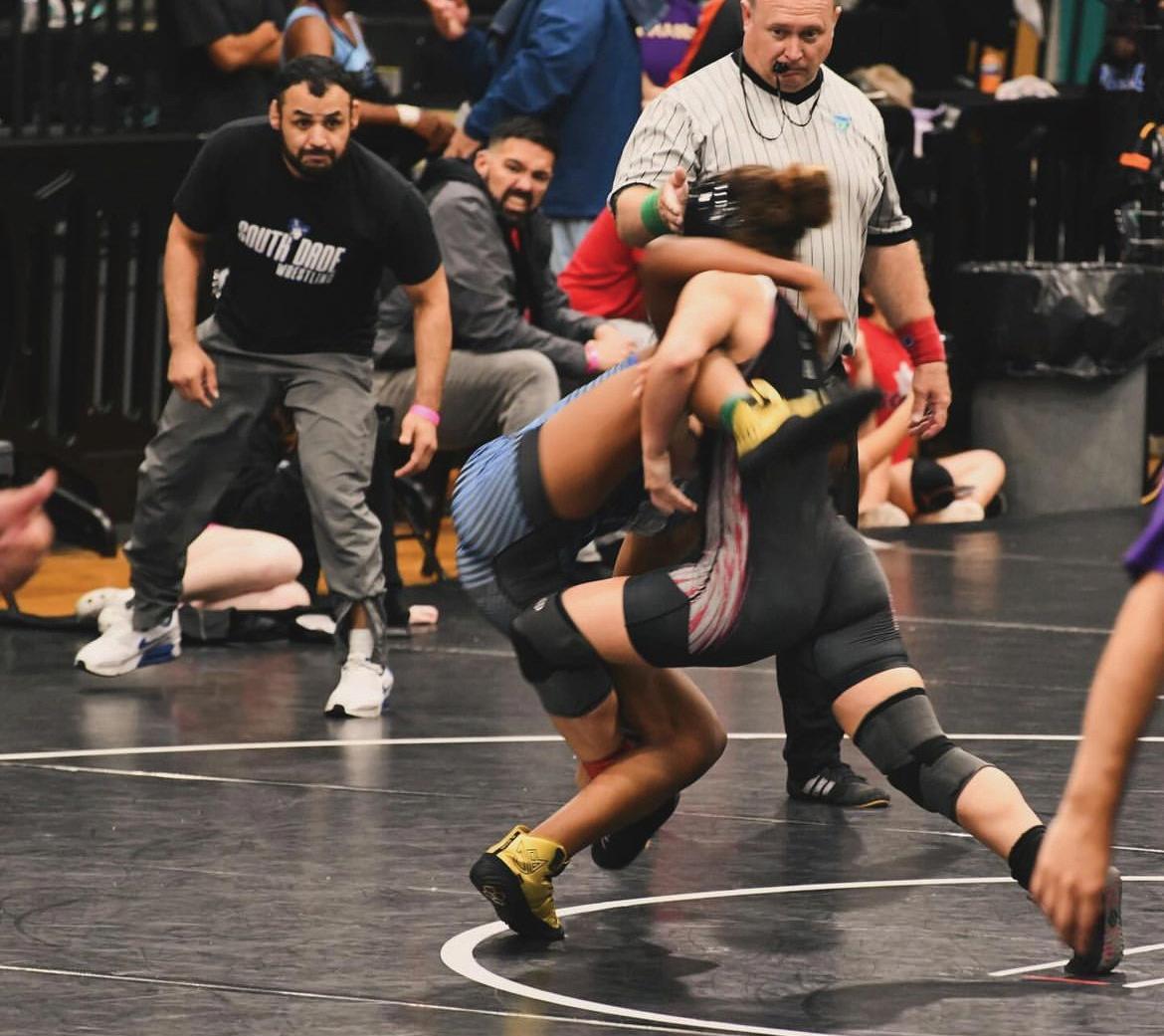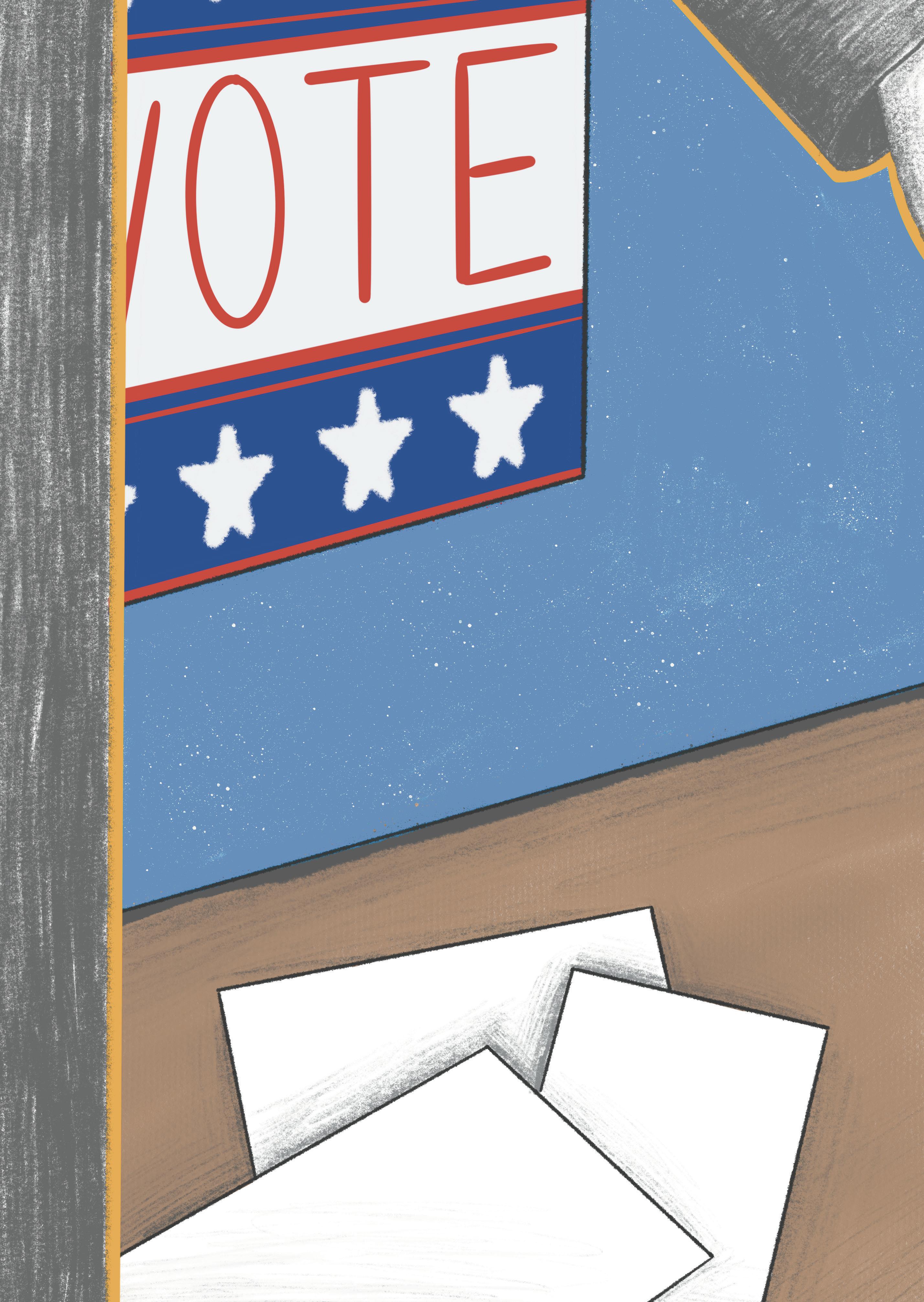


















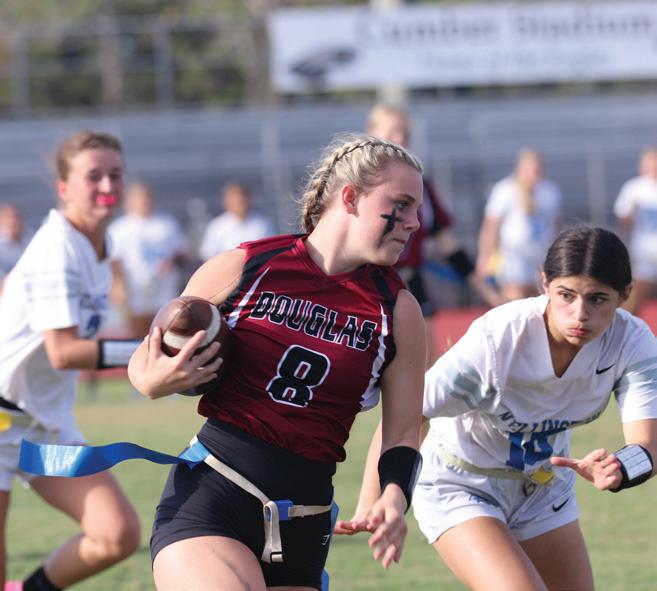
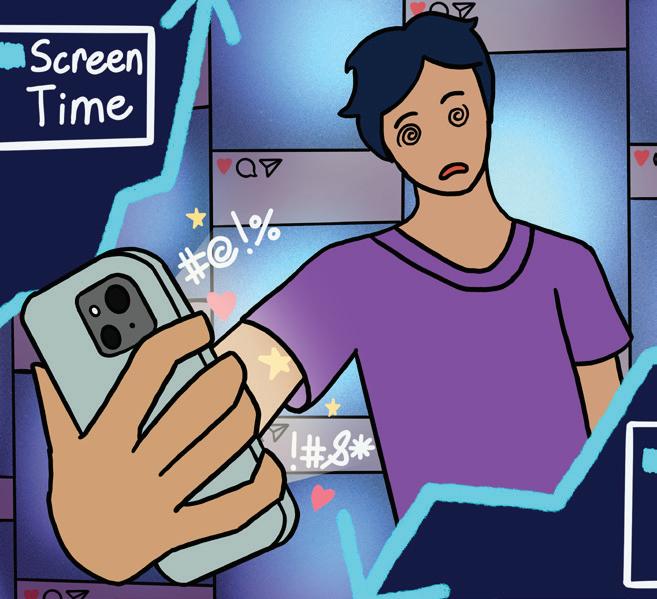

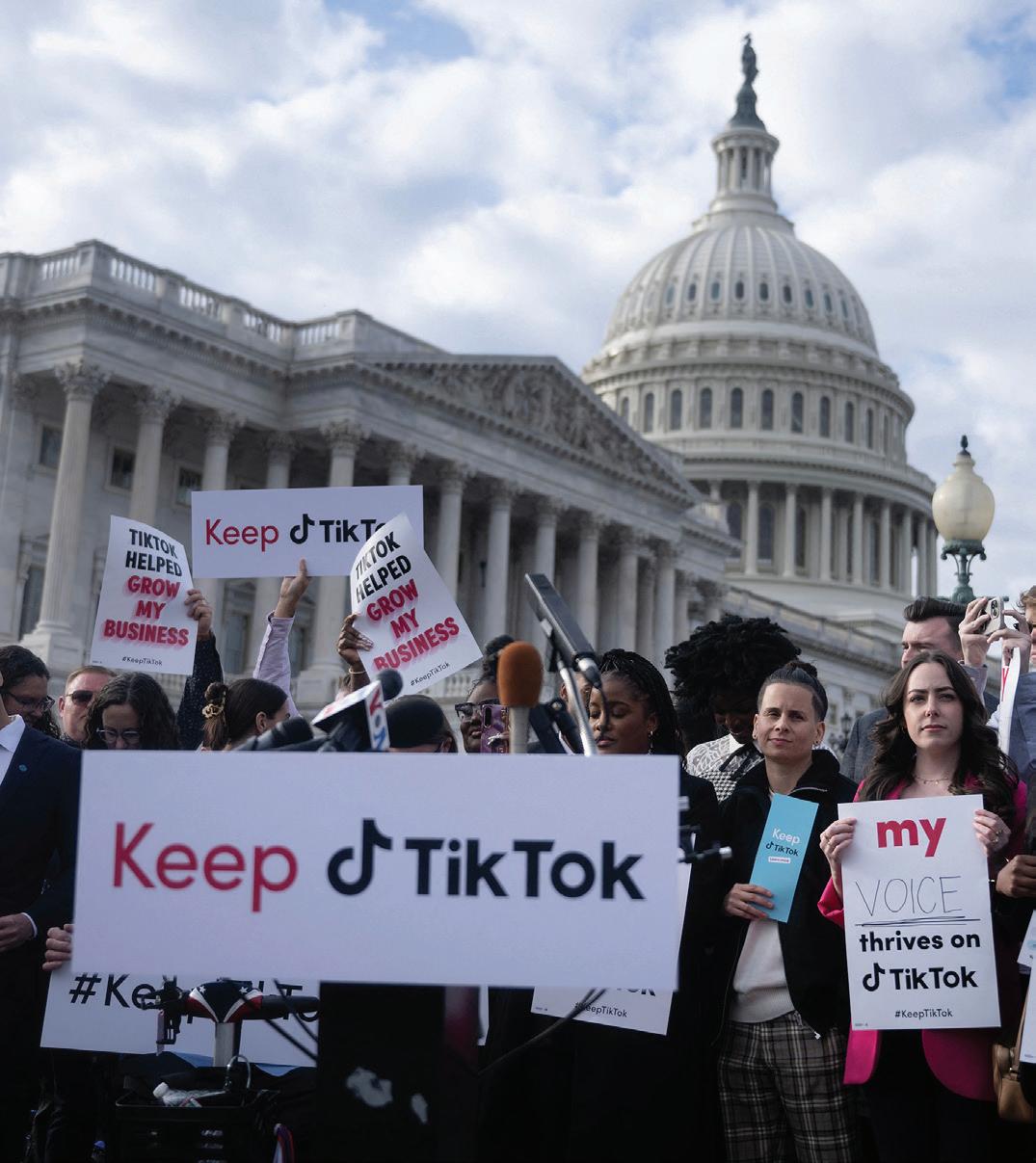
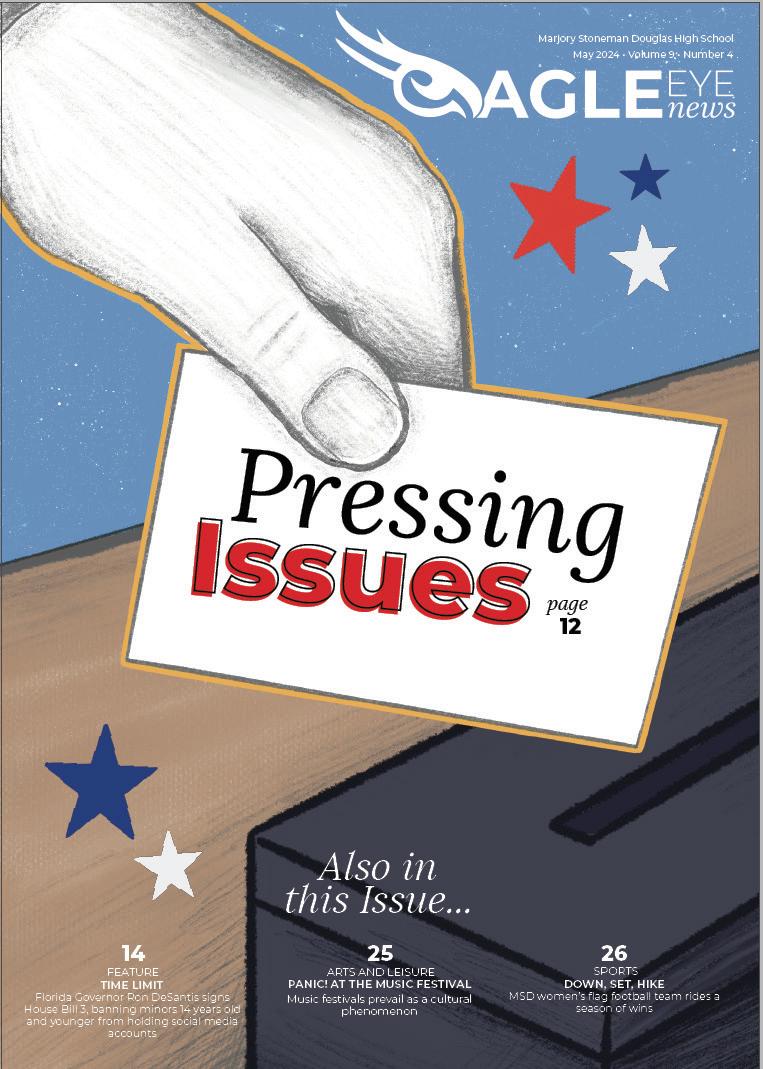
Dear Editor,
The testing schedule this year is really tightly crammed together, and it’s leaving teachers without much time to actually finish their curriculums. All the AP tests are in the first two weeks of May; there’s FAST testing once a week mid-May. Senior finals are right after that, and finals for everyone else are right after that. It leaves teachers, especially teachers who teach an AP class and have to proctor those tests, with very little time, and it’s basically taking away the entire month of May. I have several teachers right now who won’t be able to finish their plans because their students or they themselves are too busy the entire month for new lessons, and it feels pointless. Like, they made all these plans, and we’re super excited to learn the cool end-ofyear stuff, but we just can’t do it, so we have to end the class in a disappointing spot. I hope next year will be planned better by our school district so that our teachers won’t be caught off guard again.
CHRISTOPHER SALAZAR, 12
Dear, Editor
I hate waking up super early every morning to get ready for school. I don’t think anyone here likes it either., but I don’t think I would change anything about how early this school starts. In middle school, I had long morning to myself that let me sleep in and everything, but school lasted until 4 p.m. in the afternoon, and by that point the day was done with. I always hated walking home and then seeing the sun set an hour later. It felt like I wasted my entire day inside, so even though I hate how early this schools starts I would keep it the same, since I have more time for myself in the afternoon.
AVA ARGIERI, 11
Dear Editor,
Recently, since the temperatures have been rising, every day driving home I see the sprinkler system on in Heron Bay. The sprinklers are likely on more frequently to combat the heat and prevent the neighborhood’s grass from drying out. However, each time I see these sprinklers working overtime, I can’t help but think about how much water is being wasted on grass for simple beautification. I appreciate the peaceful greenery in Heron Bay.
However, this same water used to constantly replenish our grass could instead be used to help countries in need where clean water is unavailable. This would, of course, take time and money, yet so does setting up complicated water systems. This is a minor problem in the grand scheme of current environmental problems, but being environmentally conscious is the first step to enacting positive change and preserving a healthy planet.
LEAH ARAMBULO, 12
Dear Editor,
With finals coming up, I’ve been thinking about my exemptions. It’s an extra stress to decide which classes have my upmost interest to exempt and which ones I should take. As a student who has the grades to exempt all of my classes, I’ve been wondering something. If students like me have been earning grades that
we have, haven’t we already proven that we are doing well in the class? In my opinion, we shouldn’t be limited to only three exemptions. It’s another unnecessary stress factor that we have in our busy lives, why should we have to worry when we’ve already exceeded in our classes?
MYLIE MAYBERRY, 10
Dear Editor,
As the school year comes to a close, I want to extend a heartfelt message to the incoming senior class. Your final year of high school is a time of both excitement and reflection, marking the culmination of years of hard work and the beginning of a new chapter in your lives.
As you embark on this journey, remember to cherish the friendships, memories and experiences that have shaped you throughout your high school years.
Take time to celebrate your achievements and appreciate the support of your teachers, family and peers who have helped you along the way.
However, as you look ahead to your senior year and beyond, it’s essential to stay focused and motivated. This is a time to set goals,
pursue your passions, and lay the foundation for your future endeavors, whether that be further education, entering the workforce or exploring other opportunities. Apply for all of those scholarships!
Embrace the challenges that come your way with resilience and determination. Don’t be afraid to step out of your comfort zone, try new things and take calculated risks. Your senior year is an opportunity to discover your strengths, hone your skills and prepare for the next phase of your journey.
To the incoming senior class: savor every moment of your final year, make the most of the opportunities that come your way and believe in yourselves as you embark on this exciting new chapter.
MACY MEIS, 12
Dear Editor,
AI is corrupting schools all over the world. AI will put people out of jobs and blur the line between robot and human creations. As a creative writing student, I full heartedly disagree with the worldwide spread of AI technology.
I dedicate two to three hours a day to my craft, while someone else could dedicate 30 seconds and yield more success than me. Who needs to write stories anymore, when AI could conjure up a flawless alternative? Now, it’s usually easy to tell when something
is written by AI. But if students use higherlevel language, they are automatically accused. This will make college applications and school assignments much harder to navigate. It also goes for the opposite: AI can easily formulate a response in casual language, so students who utilize this tool will not be suspected. Also, students could generate an essay and use the format and some select pieces of writing for their own paraphrased response. This is very unjust for people who care about their learning and success in life.
LIA SCHWARTZ, 10
Dear, Editor
We need to bring back pretty architecture right now. I am so tired of looking at squares. I could stare at buildings like Notre Dame all day. Bring back gothic and renaissance architecture, or at least make a cool new art movement. Besides the Sagrada Família there isn’t really that many breathtaking modern day buildings. And I know–people say “it
takes to long to build”! I’m willing to wait. I wouldn’t be scared to go in a hospital if it looked like an Edgar Allen Poe character lived in it. I’d be running in. Instagram photo central, you don’t need to travel to Italy anymore! Please, future architects, get rich and creative and build pretty things.
AVA BROGNA, 11
Dear, Editor,
One thing that I’ve noticed is how fast time is going by. Apparently, it happens where the Earth progressively spins faster year by year. Since probably 2022 though, it’s just become more noticeable to me. Sometimes, it makes me anxious or like time is slipping away. I learned that one was to help this feeling is by focusing on what I’ve done for myself or something new I learned during the day. It’s actually has motivated me to make more use of my time to help myself become my best self.
AMAIYA EDWARDS,
11
Dear Editor,
The buses arrive at Marjory Stoneman Douglas High School. Not one minute later, the students get off the bus, grudgingly making their way towards the front.
This cycle continues over and over again. Day by day, some students wake up at 5 a.m. Other at 6 a.m. Either way, we make our way out of bed to go to school. Only, instead of being able to truly wake up by relaxing in the cafeteria or sitting on a bench in the courtyard chatting away with our friends, even though it’s the last thing we want to do so early in the morning.
We stand there. For ten minutes. No matter the weather, if it’s raining, humid or cold we still stand while the adults inside wait.
For what... For What?!
What Are We Waiting For!? Last year, it was fine. We only waited until 7:05 a.m., and I thought it was so everyone could get off the bus and catch up in time. Though looking back that doesn’t make much sense either. Why let a crowd gather for no reason? It’s only going to get more cramped trying to go in once they let the gate open.
So, make it make sense.
Why add five more minutes? What is waiting to open the gates till 7:10 a.m. going to do?
My mind cannot grasp the concept, and I’m SO sick and tired of standing there moody, still waking up, waiting unnecessarily for those red gates to open.
ABIGAIL RAMOS, 10
Dear Editor,
The cleanliness of this school is a major issue, and it can be improved. Lately, there have been complaints about bad smells in the halls as people are walking. The bathrooms are always nasty with toilet paper all over the floor, and there’s constantly litter everywhere. I don’t blame the janitors because they do their best, but I feel like, as a community, we could do better with cleaning up after ourselves and throwing trash in the garbage cans provided. People leave lunch trays in stairwells, and there’s always food or trash left behind on tables after lunch. Overall, classrooms are generally pretty clean, but places like the bathrooms and cafeteria could be better.
SUMAYAH STEPHENS, 12
NHS INDUCTIONS. MSD National Honor Society inducted over 200 new members in its annual induction ceremony on Monday, April 15. The ceremony marked the last NHS event for Sponsor Lisa Hitchcock, who will be retiring at the end of the school year.
JROTC BLOOD DRIVE. MSD JROTC held their second blood drive of the school year on Thursday, April 18 in partnership with OneBlood. JROTC students helped OneBlood employees facilitate blood donations by roughly 50 students.
DECA ICDC. MSD DECA members competed at the annual DECA
International Career Development Conference in Anaheim, California from Friday, April 26 to Wednesday, May 1. Seniors Aneesha Nookala and Ananyaa Sutaria placed within the top ten for project management, and junior Sebastian Bagoon placed fifth for the Stock Market Game.
BATTLE OF THE BOOKS. MSD Book Club placed second at the annual Battle of the Books on Wednesday, April 17 in the MSD media center. Book Club hosts the annual event, in which students must recall the source of a particular quote
TENNIS STATES. Junior Savita Bagirathan was named the 2024
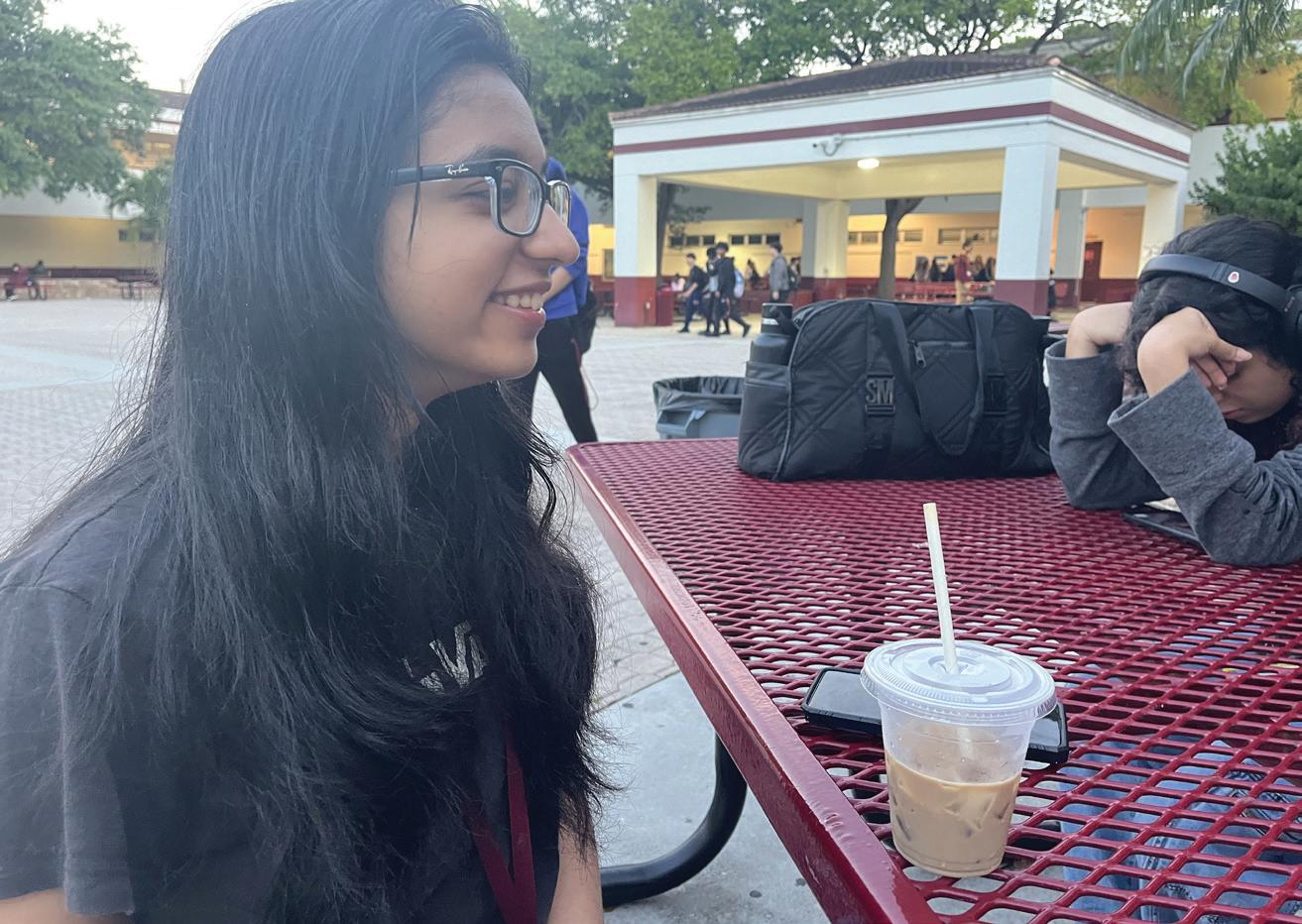

Florida High School Athletic Association Girls Overall Singles Champion after her first place win at the state championship from Monday, April 29 to Wednesday, May 1. Juniors Dennis Oliveira and Daniel Platovsky reached the final in men’s doubles.
AIR CONDITIONING. The air conditioning in the 500 building broke on Thursday, May 16, causing teachers in the 500s building to relocate. Classes were temporarily moved the morning of Friday, May 17, but resumed in their normal location after the air conditioning was fixed.
STANDARDIZED TESTING. MSD has held testing for end-of-course exams,
Florida Assessments of Student Thinking and Advanced Placement exams since the beginning of May.
BASEBALL STATES. The MSD varsity baseball team won their fourth consecutive baseball 7A state championship 3-2. The Eagles faced the Windermere Wolverines on Saturday, May 18 at Hammond Stadium in Fort Myers.
TRACK DISTRICTS. The MSD women’s track team placed third at the district tournament on Friday, April 26.
REPORTING BY Brynn Schwartz and Carolina Ochoa
Marjory Stoneman Douglas High School opened a new coffee bar on April 3 near the entrance of the cafeteria for students and teachers to purchase a selection of cold brew. Coffee is available to purchase before school and during both lunches for $3.50.
Earlier in the year, the cafeteria provided samples of the coffee in the morning to gauge students’ reactions and pique interest in the product.
“Our cold brew is mixed with low-fat milk and either French vanilla or salted caramel sugar-free syrup, making it the perfect milk component in a reimbursable meal scoring a discount,” Food and Nutrition Services Supervisor Ashley Osterman said.
The coffee bar launched during National Breakfast Week following positive feedback from students trying samples. To increase breakfast participation in the school, students receive 50 cents off their coffee order if they pair it with their free breakfast from the cafeteria.
“The coffee was better than I expected,” sophomore Nikita Singh said. “I think this is good for students who need a quick pick-me-up during school.”
The implementation of coffee bars in high schools has only just begun, as MSD is one of five high schools that were selected by Broward County Public Schools to pilot selling cold brew
MSD cafeteria opens new coffee bar for students and staff
through the cafeteria. If interest in the program continues, BCPS Food and Nutrition Services will consider implementing coffee bars into other high schools.
“We have had an overwhelmingly positive response to the cold brew coffee pilot from the students at the participating pilot high schools,” Osterman said.
Overall, student reactions to the new change on campus have been positive. Many enjoy the luxury of having coffee available to them while they are at school.
“Some students want to get coffee before school and stop at places like Starbucks to get a cup, so having the drink at school is more convenient,” Singh said.
As the product is in its early stages, students have found that there is room for improvement to provide them with an even better experience.
“It’s super good but the serving size is very small,” freshman Mariana Prado said. “The salted caramel is my favorite.”
Currently, the cafeteria has halted coffee sales while waiting for a restock on ingredients. Food and Nutrition Services hopes to introduce the cold brew offer to more high schools in the county the following school year. Using student feedback, the cold brew can improve and expand overtime, giving students the option of an energizing drink for whenever they need it.
STORY BY Grace Brill
District begins installation of new AC units, roof and fire alarm system
Marjory Stoneman Douglas High School students will have to adjust to various construction projects next year as new air conditioning units, new roofs for every building and a new fire alarm system are completed.
Installation of new AC units for the 200, 700 and 800 buildings should be completed this summer. Last summer, buildings 100 and 400 had new units installed. Any remaining buildings will receive new AC units in summer 2025.
Broward County Public Schools installed portables on top of the tennis courts during Spring Break, which will be used for displaced classes next year.
The current AC is over 30 years old and has had issues in the past. By district policy, students cannot be in rooms that do not have air conditioning or that have the air conditioning shut off for a certain amount of time. Last year, the AC went out schoolwide in January 2023, causing the school to release students 40 minutes before the end of the school day.
New roofs are going on every building except the 700 and 400 buildings. Construction started at the end of March. Buildings have been getting
worked on after school lets out at 2:40 p.m. and on weekends to help prevent noise disruptions. The project is estimated to take 18 to 20 months to complete.
The old roof caused multiple leaks in various classrooms, which made some of the ceiling panels tear apart. Many classes required the panels to get fixed, but leaks would often come back on different parts of the ceiling.
“I think the new roof is going to be beneficial not only to the maintenance of the buildings, but for the education that takes place in those classrooms,” sophomore Mylie Mayberry said. “I hope that the new roofs solve any problems that could have grown more severe if it had been given more time.”
The project should not interfere with classes, unless work needs to be done during the school day, which would cause classes to be moved.
The portables will be used no matter what, but the number of classes using them has yet to be determined. Classes could be sent to the portables temporarily as the result of work that needs to be completed for any of the three ongoing projects.
“[If I have to move], I am not looking forward to it because especially as a class, it’s dependent on having lab access to be able to cook,” culinary teacher Ashley Kurth said. “It’s going to literally take all of the physical
The number of students in the incoming freshman class of Marjory Stoneman Douglas High School is at a new low. Typically, the school would expect over 800 students in each incoming freshman class. Though the number of incoming freshmen students is not finalized yet, it is expected to be about 700, approximately 100 fewer students than usual, showing a downward trend, which started with this year’s freshman class.
The school’s permanent capacity can hold 3,077 students and has accommodated up to 4,233 students in the past. The school’s enrollment has fluctuated between 3,2003,500 students over the last 7 years. Next year’s enrollment is projected at 3,100 students.
The School Board of Broward County adopted Marjory Stoneman Douglas High School boundary plan H-1 on April 12, 2023. The boundary change moved 351 future students to Coral Glades High School. It also turned away at least 90 students who would have enrolled at MSD as freshmen for the current school year.
The boundary change likely contributed to

applications out of my class. Everything’s going to be book based,” Kurth said. “It will not be fun, but I have an entire curriculum that is prepared for book-based learning similar to what we did during the pandemic.”
In addition to these projects, the bandrooms in the 800 building will undergo renovations, as will the art rooms in the 300 building over the summer, which may not be complete by the time school begins in August.
All of these projects are part of the SMART Bond Project, an $800 million capital improvement program passed by the
voters in 2014. BCPS has been accused of mismanagement, as all the individual school projects were to be completed by 2021, but are only half complete, and overall, the SMART Bond Project is $500 million over budget.
STORY BY Rio Rice
MSD incoming freshman class numbers continue downward trend in enrollment
the smaller number of freshmen students this school year. Though MSD would have otherwise expected a freshman class with more than 800 students, the number of rezoned students decreased that number significantly.
In addition, Florida Gov. Ron DeSantis signed Senate Bill 202 into law on April 8, 2023. It took effect on July 1, 2023. The law removed income-eligibility requirements that were part of the previous state school funding programs and makes all students eligible for taxpayer-backed vouchers for private schools. It has likely affected freshmen enrollment for this school year and could also affect next year’s enrollment numbers for freshmen.
Many families in the Coral Springs-Parkland area likely took advantage of the opportunity to apply for scholarships to private schools, further decreasing the expected number of incoming freshmen.
“My brother is in eighth grade and applied for a scholarship to North Broward Preparatory School,” sophomore Agnes Stephen said.
The decreased number of incoming freshmen can have a notable effect on MSD’s budget. The
state of Florida provides a per pupil expenditure each year. The less students at school, the less flexibility there is in the budget.
Teachers’ salaries are included in the budget, so if enrollment is down, teaching positions are reduced, which can result in teachers being surplused.
Student schedules could also be affected by the decrease of incoming freshmen. The more students there are at school, the more courses MSD can offer. Losing a large number of students could result in decreased course variety.
MSD has already seen the effects of the low freshman class this year, as some teachers had less than the average number of students per class, and in October, administration collapsed 26 sections to relieve budget constraints. When sections were collapsed, teachers that lost a section also lost their extra period supplement, which is $6,000 per extra period.
Despite the downward trend in the enrollment of freshman students, it is not yet a major cause of concern for MSD’s administrative staff.
“There are plenty of schools with less than 700 kids in each individual grade that operate
the same way that we do, and they are just fine,” Assistant Principal Robert Johnson said. “So is it concerning? Yes. Is it enough to hit the panic button? No.”
Under enrollment is a district-wide problem, as the county is operating with 54,000 open seats for students who have left for private schools, charter schools and homeschooling.
Broward County Public Schools released a list of schools that are running at 70% capacity or less. There are 15 schools on the list that are under 50% capacity, including Pines Middle, which is operating at 34.5% and Broward Estates Elementary, which is operating at 35.7%.
In a Broward County School Board Meeting held Tuesday, April 16, the superintendent discussed the plan of repurposing or closing under-enrolled schools in the county.
After contentious community meetings about specific schools identified for closure, Hepburn backtracked on the plan. On May 15, the school board directed Hepburn to come back with a plan to close seven to eight schools for the May 29 meeting.
STORY BY Lydia Varghese





1200 building to be demolished beginning June 13
STILL STANDING. The 1200 building, the location of the Feb. 14, 2018 shooting at MSD that killed 17 students and staff, stands for its final year before its demolition this summer. The faculty proposed a legacy field to replace the building, which would serve as a memorial, while providing a space for student activities such as band practice.
Broward County Public Schools is moving forward with plans to demolish the 1200 building, which was the location of the deadly shooting that left 17 dead and another 17 wounded at Marjory Stoneman Douglas High School on Feb 14, 2018. Demolition work will begin immediately following the conclusion of this school year on June 13.
The building will not be imploded, but slowly dismantled. BCPS reached the demolition decision with advisement from health and safety experts on how to best protect the well-being of students and staff on campus. They wanted to ensure that the demolition would not interfere with learning or cause harm through any dust caused by construction.
“We understand the urgency of this matter, but it is essential to prioritize safety above all else,” district officials said in a 2023 statement. “In preparation for the demolition, crews will clean and clear the building, adhering to state and the Environmental Protection Agency’s landfill disposal regulations. As we continue to heal, we remain steadfast in our commitment to supporting the Marjory Stoneman Douglas community and will provide updates as information becomes available.”
The building remained an active crime scene after the shooting to preserve the evidence needed for investigation and pending criminal trials. The last trial concluded in June 2023.
It is not currently known what will be put in the building’s place.
The school’s Faculty Council, which consists of 11 teachers selected by the faculty to represent and solve issues affecting teachers, created a proposal for the creation of a “Legacy Field,” This multipurpose field would serve various student groups, including band and JROTC as a practice field.
Faculty council surveyed the rest of the staff to gauge support for the proposal. Of the 153 staff members who responded, 121 were in favor of a multipurpose field, 47 of whom were present on Feb. 14, 2018. Nine staff members voted in favor of another memorial, and another nine voted for an additional parking lot. Their write in responses on the staff survey determined the options that appeared on the student survey.
Leadership students and volunteers distributed the survey during the second period on Monday, March 18. The instructions ask students to rank their top three choices out of the seven options provided. Out of the 1,677 responses, a parking lot was the most popular option, chosen 1,045 times. Second place was the aquatic facility and third was the multipurpose field.
“I think another parking lot would be really useful,” sophomore Isabella John said. “I know a lot of seniors probably still need parking, and maybe juniors would also be able to park there, so they wouldn’t have to walk all the way to the park.”
On Sept. 16, 2023, the victims’ families were allowed to tour the building one last time before it was sealed off. The tour was a step forward for some in their healing process and in moving forward as a community.
“It’s very difficult for our families to have to walk through that building, but we do it because we know that lessons can be learned from the failures that occurred here that day,” Tony Montalto, father of victim Gina Montalto, said to CBS News on Oct. 15, 2023. “Everything from the need to strengthen the doors so they can’t be shot through, to having the doors lock on the proper side so that the teachers, some of which died, some of which were shot, tried to lock their door on the wrong side.”
Vice President Kamala Harris visited MSD on March 23, one of the last public figures to tour the 1200 building before its demolition. Harris, who oversees the White House Office of Gun Violence Prevention, used the visit to spread awareness on gun violence and gun control.
“I was in classrooms where, frozen in time, the laptops of that era are still on the desks which have since gathered dust,” Harris said to the press following her tour. “Frozen in time, on some of the desks, the snacks that some of the students were eating.”
The demolition of the 1200 building should be completed by the start of school in August, but there is no timeline on when construction will be completed and no final determination yet on what will go in the building’s place. No matter what takes its place, people hope the building removal will serve as a source of healing and moving forward for the MSD community.
STORY AND DESIGN BY
Jasmine Bhogaita

OF SOLIDARITY. Created and donated by a local artist, the #NeverAgain statue depicts an eagle embracing a heart and is surrounded by rocks with positive messages. Located across from the 1200 building in the senior courtyard, it serves as a memorial for the 17 lives lost in the Feb. 14, 2018 shooting at MSD.
REFLECT AND REMEMBER. Located adjacent to the 1200 building, the MSD Remembrance Garden memorializes each of the 17 victims that died in the 1200 building on Feb. 14, 2018. Students and staff are able to enter the garden and read the individual memorial plaques.
TO
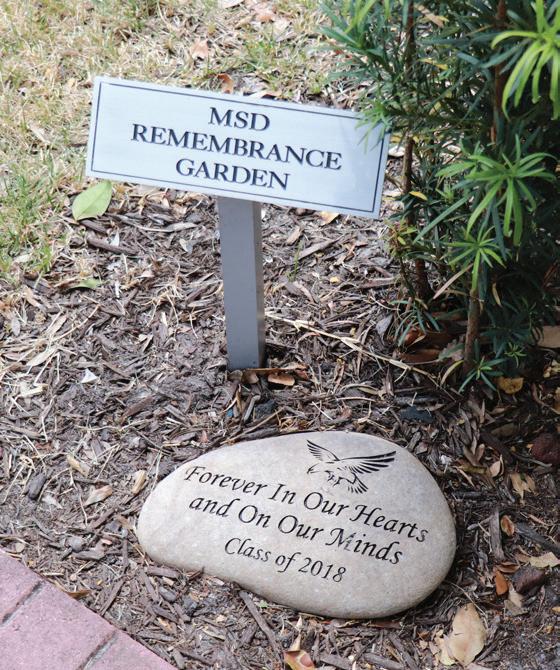

REFLECT AND REMEMBER
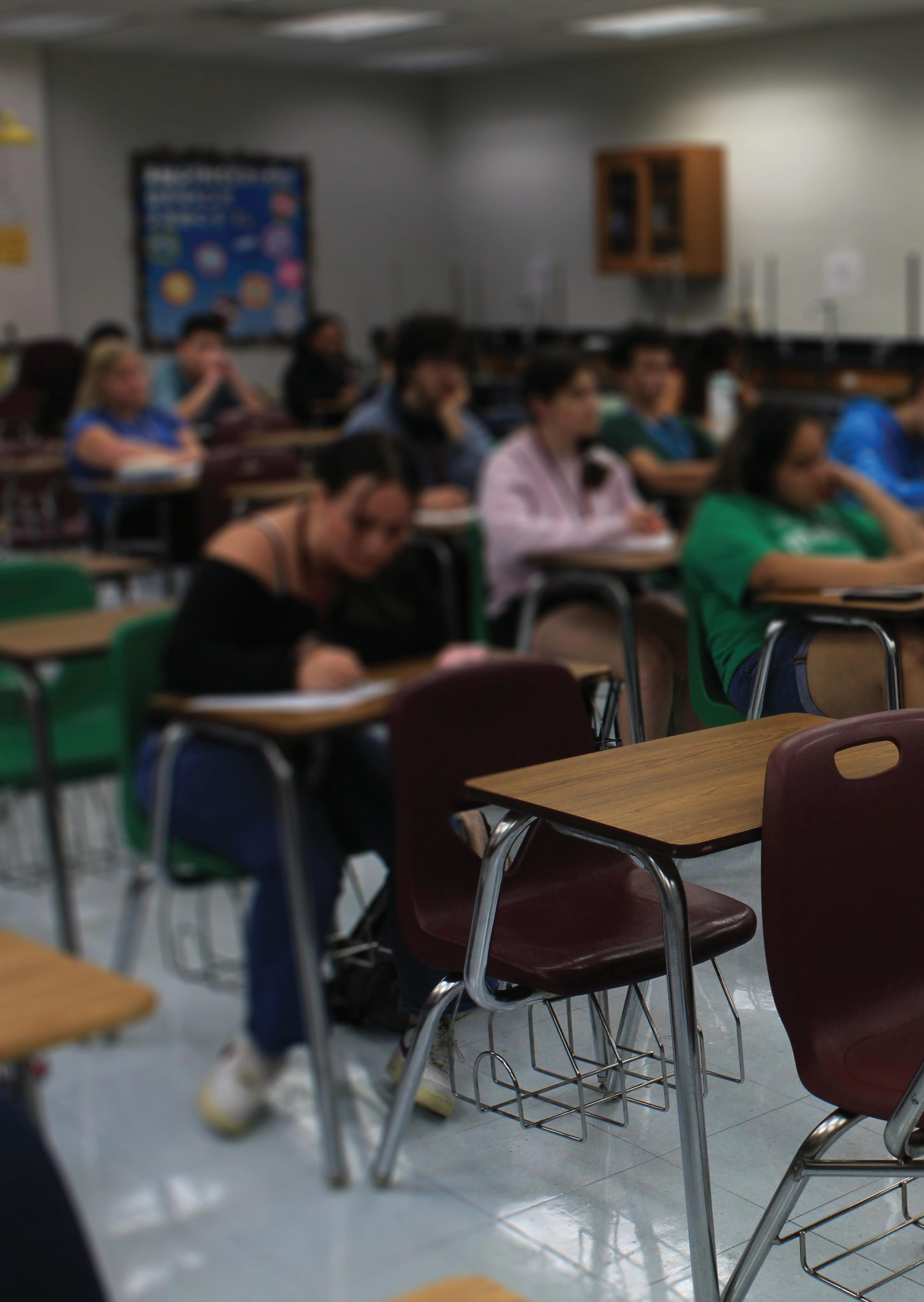
Let me stay home today,” students plead across the nation in unison. Different homes, different lives and entirely different situations, and yet one desire rings universally true: the desire to skip school. One student has not been to school more than three days a week since it began back in August. It is not that he has any justifiable excuse for his absences–he simply has no inclination to go. Another cannot get out of her bed. Her anxiety is debilitating, and this the third mental health day she has taken this week alone. Both are considered chronically absent, joining the near 16 million other students deemed chronically absent in 2022, according to PBS.
Chronic absence, considered by the U.S. Department of Education to be a “hidden educational crisis,” occurs when a student misses 10% of the school year, or roughly 18 full days. Recognized as a serious and increasing issue affecting schools across the nation, it all comes down to one simple fact, which is that students are attending school less and less.
Chronic absenteeism has been indiscriminate, befalling students in districts across the U.S. regardless of their income levels, backgrounds and other variable factors, including those in Broward County, and more specifically, at Marjory Stoneman Douglas High School. In a survey conducted by Eagle Eye News, of 329 MSD students, 21% reported having been absent 18 or more times this school year and 28% reported having been absent 18 or more times last school year.
When COVID-19 struck, teenagers’ lives were altered forever, and one area that took a particularly massive blow was education. Their schooling now took place online, schools became increasingly lenient in their grading and discipline–according to the Washington Post–and ultimately, teens fell behind. As explained by Wiley University Services, online school set up a false pretense in which students began perceiving school as optional; something that was once an obligation became something they could do–or not do–at their leisure.
“COVID made school more optional because sometimes I didn’t feel like I was obligated to log in, especially if I knew the teacher would just give us the work and allow us to take an attendance quiz to prove that we were up,” senior Rebecca Pierre said. “Also, it made it optional because I didn’t have to get up and get ready for school.”
Once in-person school returned to what people deemed “normal,” not much about it remained the same. Whether that be quarantines, wearing masks, students still joining classes via Microsoft Teams and all of the other necessary precautions, normal was no longer a word that could be used to describe it. However, it was not just school that was different, but students’ attitudes towards it.
Since the pandemic, the number of students deemed chronically absent has spiked, going from 15% in 2019 for all students, to 26% in 2023 as reported by the New York Times. Accordingly, this statistic spiked in Broward County Public Schools as well, going from 19% in 2019 to 33% in 2023. This upwards trend of chronic absence has been seen nationwide, and many attribute it to the perceived “optional” relationship with school brought on by the pandemic.
When school went online, the idea of attending class daily was no longer existent; students could log into Teams meetings from their beds and oftentimes had the ability to simply shut off their camera, mute their audio and tune out completely if that is what they desired. The long instilled routine of waking up early, going to school and having to actually be physically and mentally present in class was disregarded.
According to an Eagle Eye News survey, 57% of MSD students reported online school as having made school feel more optional. The chronic absence resulting from this feeling is one that has been concerning experts and educators in particular due to its enhancement of the achievement gap, or disparity in academic
performance, created by COVID-19. Limiting students’ access to quality education, the pandemic forced teens into a form of learning that was largely dictated by whether or not they actually wanted to learn.
At MSD, 34% of students admitted to having not kept up with, or put effort into their schoolwork during the pandemic.
“During COVID, I was really just going through the motions, not really there [in online classes],” sophomore London Abdala-Rivera said. “Since, my grades haven’t been the greatest, and I have a hard time finding motivation for school.”
Consequently, student test scores in the U.S. declined by 15% of a standard deviation in math and 10% of a standard deviation in reading from 2018 to 2022 according to a White House released in 2023. The achievement gap created by COVID-19 has been a pressing concern for many and it is only being further enhanced by the current culture of chronic absenteeism.
Absenteeism now has the same impact on student achievement that COVID-19 had, with the lowering of students’ grades and performance on standardized tests, namely in the subjects of math and English. According to the White House, “the observed association between absenteeism and test scores is large enough to account for 16-27% of the overall test score declines in math, and 36-45% of the declines in reading” between 2019 and 2022.
“During COVID instruction, many students became comfortable with cheating on assignments with available technology,” math teacher Jeffrey Taylor said. “The development of a dependency on cheating has an inverse relationship to development of mental toughness required for problem solving. This has resulted in lower test scores as students are now testing in the classroom.”
Also in relation to the subjects of English and math, absenteeism and the learning loss it causes results in course grades declining substantially. The White House has made this clear, reporting that missing ten classes reduces English and math grades by about 18% of a standard deviation. If students are not present to keep up with their work, it is only natural that their grades will decline.
Still, from the pandemic grew not just shifted attitudes regarding education, but also the expectation from students that their schoolwork would always be available online and able to be completed remotely. After all, students each went back to in-person learning at their own pace, and once everyone finally did, the possibility of quarantines still meant that work must be available for them digitally.
Teachers were now expected to rely almost completely on apps like Canvas to make assignments available to students, administer tests and have work submitted back to them. Conducting education in this manner has become so normalized that it has given students the notion that if they were to miss school, they would still be able to keep up with their work online. This gives students an excuse for their absences that did not exist before.
“The fact that schoolwork is now available online has played a role in my absences because if I know it’s all available online, I don’t actually have an urgency to actually go in the building,” junior Aniya Agenor said.
This notion has become so common that many parents have even adopted it, presuming that their child will be able to keep up with their schoolwork while on vacation, thus opting to travel on school days. It is things like this, however, that lend themselves to the increased number of absences racked up by students.
Prior to COVID-19, it had already been established that today’s teens were enduring mental health problems at alarming rates, a predicament that was only further aggravated by the pandemic. In a 2022 news report by the World Health Organization, it was found that “the pandemic has affected the mental health of young people and that they are disproportionally at risk of suicidal and self-harming behaviours.”
At MSD, 45% of students reported their mental health is worse now, post-pandemic, than before it.
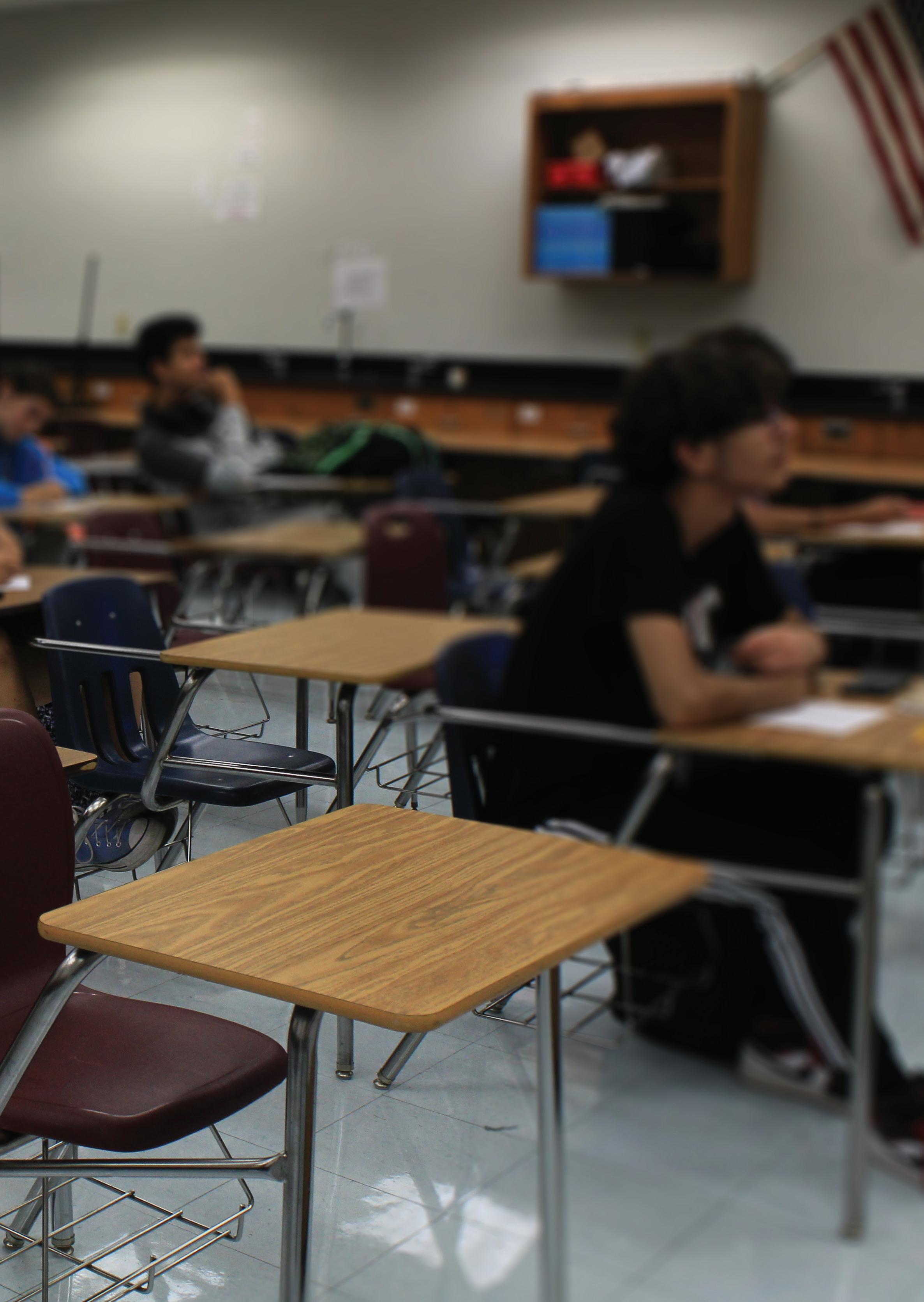
47% of MSD students believe COVID set them back academically
84% of MSD students dislike the 10-10-10 rule
21% of MSD students report they have missed 18 or more days of school this year
47% of MSD students feel behind when they miss school


The mental health-related difficulties endured by teens are, at least in part, contributing to the nationwide problem of chronically absent students. Teens may need a mental health day–or several–to try and work through their problems without enduring the added stress of school. In fact, this is the very reason 33% of MSD students have taken at least one day off from school this year.
“I have 100% taken days off for my mental health,” freshman Olivia Davie said. “I have diagnosed anxiety and depression, and I am on medication and in therapy. Even with all of those resources, I still need days for my mental health. There are just some days that I am physically unable to do work or go to school. In fact, last silver day, I left early for my mental health. Everything was getting too stressful, so I had to leave school.”
School has been getting increasingly stressful for students as it is currently more competitive than ever to get into top colleges. The Common Application has reported
“According to USA Today in 2023, a growing number of students–namely those with anxiety–are engaging in school avoidant behavior, or school refusal. This term generally refers to two things: the inability of a student to attend a full day of school without difficulty or a student’s outright refusal to attend school.
This behavior can look like anything from needing to escape to the nurse’s office during school hours to being absent from school for months or years on end. It is a spectrum, and although experts are still in dispute over how many students are affected, they do agree on one thing: that it has gotten worse since COVID-19.
Unfortunately, while chronic absence may be induced by mental health struggles, it can also cause or exacerbate them. Mental illnesses, such as anxiety and depression, often include the symptom of social withdrawal, which can enhance one’s feelings of loneliness and fuel their mental illness in turn. This same thing goes for school absences; a student may take off hoping to better their mental health; however, the potential loneliness and bad habits that result may only worsen the very thing they are trying to improve.
During COVID instruction, many students became comfortable with cheating on assignments with available technology. The development of a dependency on cheating has an inverse relationship to development of mental toughness required for problem solving. This has resulted in lower test scores as students are now testing in the classroom.”
Jeffrey Taylor, math teacher
the total application volume having risen 30% from 2019 to 2022. With that rise, college acceptance rates are plummeting at both Ivy Leagues universities and others alike. New York University, for instance, has announced an acceptance rate of 8% for the class of 2027, which is a record low for the college and a 4.2% decrease from 2022.
This means that students are pushing themselves more and more in an effort to stand out from their classmates. This involves things like taking even more academically rigorous classes, stretching themselves too thin in terms of extracurriculars and studying harder than ever in order to outdo their classmates in grades and test scores.
“Increasing competition in college applications has made me more stressed about school,” freshman Viviana Meaney said. “I’m only a freshman, and I constantly think about how other older people are already getting into those schools. As this happens the stakes for getting into college get higher–higher GPA, more class requirement and more. I get more stressed thinking about how I won’t be able to get into colleges due to the competitive nature that now exists. I get stressed and think about what classes I need to take to be more likely to get into colleges, causing burnout and exhaustion.”
Post-COVID-19, schools have also seen the issue of widespread behavioral problems. This was highlighted in a 2022 survey conducted by the National Center for Education Statistics, in which “respondents attributed increased incidents of classroom disruptions from student misconduct (56%), rowdiness outside of the classroom (48%), acts of disrespect towards teachers and staff (48%) and prohibited use of electronic devices (42%) to the COVID-19 pandemic and its lingering effects.”
“The attention span [of students] is very short,” English teacher Debra Jacobson said. “I see a lot of students sleeping. I had to take phones for the first time since the shooting because I was fighting a battle I could not win. I have written more detentions and referrals this year, so far, than in all my previous years here–I started in 2013.”
Behavioral problems are closely tied to the issues of chronic absenteeism and the declining mental health of teens. After all, behavioral and absence-related troubles are closely tied to stress and the fight or flight response it induces; behavioral issues are a manifestation of the fight response, and absenteeism is a manifestation of the flight response.
For some students, though, mental health days are not enough, and they take the flight response to a new extreme.
Furthermore, it is common to hear students point towards oversleeping as a cause of their absences. Twenty one percent of MSD students have admitted to oversleeping being a cause of at least one of their absences this year. Yet, while this is commonly caused by things as simple as forgetting to turn on one’s alarm, it can also be linked to one’s mental health.
Dr. Michelle Drerup told the Cleveland Clinic in 2020 that “oversleeping is a symptom in 15% of people with depression” and specifically in those with atypical depression–a type of depression in which a person’s mood can improve in response to a positive event. There is even a sleep disorder called hypersomnia, which is the inability to stay awake during the day, which is associated with oversleeping.
At MSD, various efforts have already been made in an attempt to improve student attendance. This school year, the 10-10-10 rule took effect, allocating each student a total of 10 absences, 10 sign-ins and 10 sign-outs a school year. Exceeding any of these means not receiving senior privilege and parking, which are motivating incentives for freshman, sophomores, juniors and even seniors–whose privilege and parking can be taken away–alike.
Senior privilege refers to seniors’ ability to have an off-campus study hall, while senior parking refers to their ability to park in the senior lot. This rule was enacted with the specific purpose of combating the increasing issue of student absences at MSD and has worked exceptionally well. As reported by MSD’s administration, full-day absences totalled 38,206 last year during the first semester and only 18,925 this year, marking a 50.4% difference.
Despite undoubtedly improving student attendance, the rule has been ambivalently received by MSD students, who recognize its impact, but still express concerns over some of its implications. Nineteen percent of MSD students reported that the rule has improved their attendance regardless of the fact that only 7% of MSD students actually admitted to liking the rule.
“My opinion regarding the 10-10-10 rule is more negative rather than supporting it,” junior Kaytelyn Xavier said. “I feel that the rule doesn’t even consider the students that have to walk or have parents that work long jobs where sometimes they don’t have a for sure ride every morning at 7:00 a.m.”
more appealing by offering things like free and reduced lunches and other enticements. Free and reduced lunches, as well as MSD’s new coffee bar, are both things that have been established at school that aid, whether intentionally or not, in improving students’ attendance.
“I tried the coffee at the new coffee bar, and some of their other food, and thought it was great,” sophomore Emma Schwartz said. “It gives me a little more incentive to come to school as at least I know I have something to look forward to once I get there.”
The reality of the situation is that chronic absence has spiked and now more than ever needs to be addressed. Some have suggested that this is the new normal; however, achievement gaps and unmotivated students are anything but normal. Just because masks are not worn, social distancing is not in place and people are not quarantining, does not mean that COVID-19’s lasting implications have been escaped. Students are not attending school and judging by current trends, this will not change if the work is not put in to change it.
STORY BY Andie Korenge
GRAPHICS BY Liliana Griffis

Some students have serious reasons for finding the 1010-10 rule unfair after all. It is not always possible for every teen to get through the school day or get to school at all depending on situations completely personal to them.
“Mental health days are a necessity to me, but with the new 10-10-10 rule, I have not been able to take them as often,” Davie said. “This has caused my grades to drop due to the sheer amount of stress I have been under.”
Another way schools across the U.S. have tried improving student attendance is by attempting to make it

Politics increasingly impact students’ lives
Whether one is simply opening a social media feed or switching through channels on television, people usually find themselves at a common endpoint: politics. Whether it’s an advertisement for a local congressman running for reelection or podcast snippets discussing recent laws passed, politics remain a defining part of American culture.
As the Congressional session and presidential election year begin, big changes are on the ballot. Never before in history has politics and government policies been so readily available to such a wide, impressionable audience.
Through the use of social media platforms, such as TikTok, Instagram and X, formerly known as Twitter, politicians are able to share their opinions. It is through these platforms that teens are being exposed to political issues and are granted the ability to share their own
thoughts on current events.
As 2024 is an election year, some juniors and seniors at Marjory Stoneman Douglas High School will have the chance to vote for president for the first time this November. President Joe Biden and former President Donald Trump will go head-to-head for a second time after the 2020 election, leading to increased interest in who will win the presidential race.
Florida is also seeing an eventful year of bills in its Legislature and amendments to the Florida Constitution, including enshrining abortion rights, legalizing recreational marijuana and making school board elections partisan.
As the new generation of voters, students will inherit the responsibility of upholding government integrity and letting their opinions carve the way for a better future.
STORY BY Jasmine Bhogaita
DESIGN BY Grace Brill
14
21 16 22 Time Limit
19
Florida bans social media accounts for minors under 14
Casting a Vote
Constitutional amendment to enshrine abortion rights on November ballot
Changing the Constitution
Floridians to vote on six constitutional amendments this year
23
Clarity in the Courtroom
Court case settlement in ‘Parental Rights in Education Act’ lawsuit brings clarity to law
Opinion: Yes on Four
Florida’s ballot initiative is important for more than just general abortion access
Opinion: Digital Detox
Florida implements ‘Online Protection for Minors’ law to regulate minors’ social media use for fair reasons
Opinion: No Show
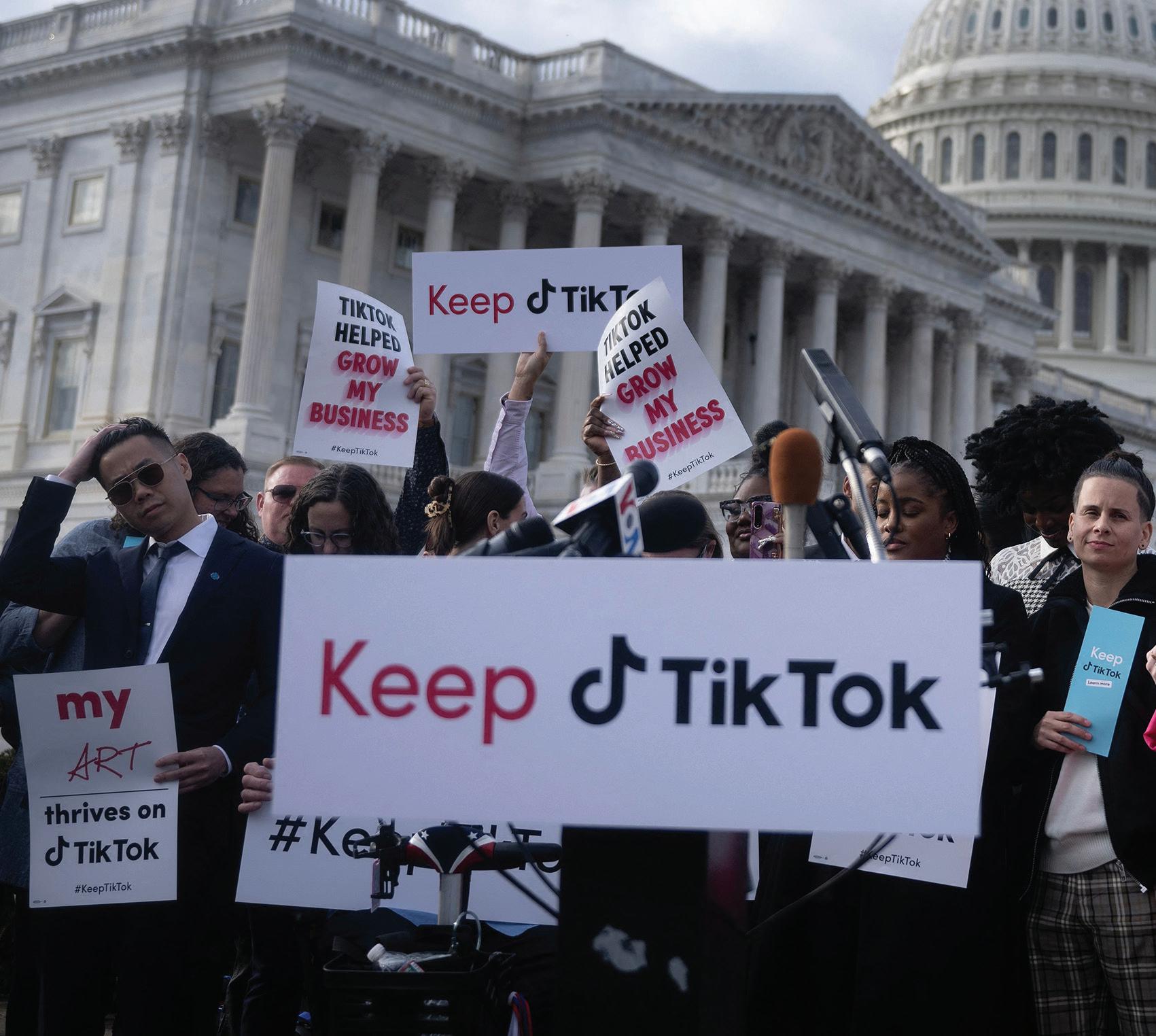
School boards should not show party affiliations on the ballot
Tallahassee’s recent legislation has been extremely limiting on teen’s freedom of speech, not that it prevents them from exercising their speech, but in that it dismantles the environment where that speech can occur.”
Saed Murad, 12
“If social media is being banned, I don’t think that’s limiting teens freedom at all. Freedom on social media isn’t the only way to express yourself or feel like you can do whatever you want. I believe there are more opportunities outside of social media that teens can look into because social media becomes very unhealthy after a while.”
Sumayah Stephens, 12
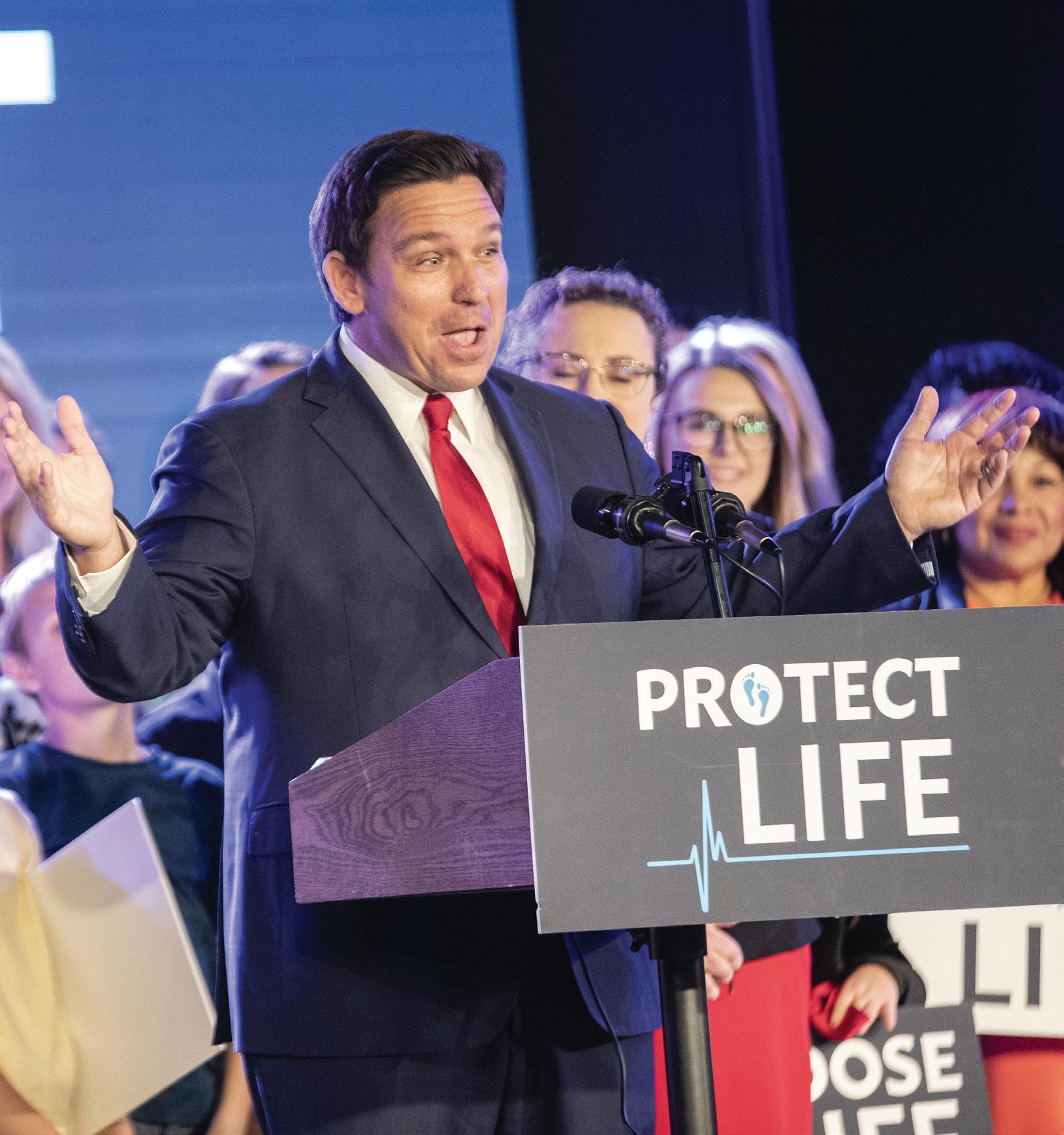
“
Things that teens enjoy like TikTok are a main focus right now, as it is getting banned, while way more harmful things like weed, vapes, and alcohol aren’t even being talked about.”
Landon Safra, 9




Florida Gov. Ron DeSantis signs House Bill 3, banning minors 14 years old and younger from holding social media accounts
After her eyes finish trailing along the endless lines of the assignment directions, the familiar rush of dread and fatigue bloom at the pit of her stomach. Her fingers betray her miserable attempts to focus as they impulsively reach for the cellular device which now rests comfortably at the palm of her hands. She promises herself only five minutes before she must return to the assignment displayed on the screen in front of her. A laugh escapes her throat as a video of a cat flashes on the screen, her thumbs scrolling mindlessly through a void of infinite content, untangling the anxiety knotted deep in her chest. Her eyes drift to the time on the clock–when did it become midnight?
As social media addiction among teenagers is an escalating concern in the United States, government officials have begun taking measures to combat the issue.
Florida Gov. Ron DeSantis signed a bill into law prohibiting minors under the age of 14 from possessing an account on social media platforms on March 5. House Bill 3–expected to take effect on Jan. 1, 2025–requires all social media networks, such as TikTok and Instagram, to terminate accounts of Florida users under 14 years of age in addition to personal information affiliated with the account. Failure of the social media platform to comply with the terms stated in the law could result in a $50,000 violation fee by the Department of Legal Affairs.



“
I spend way too much time on [social media], and then my day goes by, and I am so stressed beause I still have things to get done. It’s fun to relax and disconnnect, but other things can do that too.”
Rebecca Rinderknecht, 09
HB 3 further mandates that individuals 14 or 15 years of age who currently hold social media accounts are obligated to gain parental consent in order to continue using the app. If the parent or guardian refuses to do so, the accounts will be permanently suspended.
According to an April 1 press release from DeSantis’ office, the law is the most restrictive attempt to regulate minors’ social media access in the U.S.; thus, it is expected to face legal challenges. Since the announcement of its approval, the law has faced controversy–primarily the concern of infringement upon Floridians’ First Amendment rights.
“Outright banning minors from social media sites does not address the potential harm they may encounter on social media sites, but instead prohibits them from sharing and engaging in constitutionally protected speech,” director of the free-speech group PEN America Florida Katie Blankenship said in a March 4 press release. “We know social media sites can present significant risks to minors, but the state’s response to such risks should be tailored to minimize harm, not passing measures that violate Floridans’ constitutional rights.”
However, Speaker of the Florida House of Representatives Paul Renner perceives this law as a method of preventing minors from scrolling mindlessly on their social media feeds.
“What we have addressed is the addictive features that are at the heart of why children stay on these platforms for hours and hours on end,” Renner said at the bill signing event on March 25.
American minors ages 5 through 19 often exceed the two hour screen-time recommendation, as reported in
a 2023 study published in BMC Psychology. On average, children and adolescents spend up to 6-9 hours on screens, excluding extracurriculars and school work.
According to a survey conducted at MSD, 42% of students report having an average screen time of 6-9 hours, and 48% admitted that social media caused them to fall behind on homework. Eighty-one percent believe social media is responsible for raising their screen time average.
“I spend way too much time on [social media], and then my day goes by, and I am so stressed because I still have things to get done,” freshmen Rebecca Rinderknecht said. “It’s fun to relax and disconnect, but other things can do that too.”
Although social media fosters an environment of interconnectivity and easy access to endless information, platforms such as TikTok and Instagram can foster a toxic culture. Body image dissatisfaction, cyberbullying and predation are frequently associated with such apps according to a January 2024 Cleveland Clinic article about the negative effects of social media on children. Apps like TikTok and Snapchat offer various filters which allow an individual to manipulate and falsify their appearances to meet beauty standards. Normalization of such trends influence the viewers to understand these unrealistic standards as “normal” which negatively shapes their perception of their self-image.
An August 2022 Digital Wellness Lab’s Pulse Survey revealed that 46% of teenage girls ages 13-17 said social media made them feel worse about their bodies.
“I think that with the technology we have access to these days that lets us change and edit things almost effortlessly; it makes a lot of opportunities to come across things that are manipulated and aren’t actually the reality of it,” junior Analyse Armstrong said. “It gets really easy, especially for young people to be negatively influenced by what is being conveyed as a ‘standard.’”
Cyberbullying is common amongst social media sites, as individuals can post negative and hurtful comments while keeping themselves anonymous. According to a 2022 Pew Research Center report, 46% of the U.S. teen population have reported falling victim to cyberbullying on social media with offensive name-calling accounting for 32% of the incidents.
The U.S. Surgeon General warns that teens who spend more than three hours on social media are subject to double the risk of depression and anxiety. Forty-on percent of MSD students believe social media has negatively impacted their mental health.
Social media platforms also increase the risk of adult predation on minors. According to the U.S. Surgeon General and the American Academy of Pediatrics, 6 out of 10 teenage girls have been contacted by a stranger on a social media platform by means that make them uncomfortable.
With the increased use of social media, access to inappropriate content has become more available to minors. The National Society for the Prevention of Cruelty revealed that 56% of 11-16-year-olds have been exposed to explicit material through online platforms.
To counter this issue, the law requires pornographic or sexually explicit sites to use age-verification technology to ensure that users are not lying about their age and that minors are unable to access the content on those sites.
DeSantis hopes that this law will give parents greater autonomy over their children’s actions online, and thus protect minors from the “dangers of social media.” By cutting social media’s presence off of minors’ phones completely, he believes HB 3 can restrict social media’s toxic culture from reaching children.
“Social media harms children in a variety of ways,” DeSantis said in a March 25 press release. “HB 3 gives parents a greater ability to protect their children.”
However, the effectiveness of this law has been questioned. Although 63% of MSD students believe that social media is dangerous and should be kept away from minors, 55% of students believe the law will be ineffective at preventing minors from creating social media accounts.
Although this law strives to limit social media use, critics point out that teenagers have been avoiding
parental restrictions on social media apps since their inception.
Teenagers are already able to successfully lie about their age and gain access to alcoholic drinks with fake identification cards, according to a survey conducted by the Substance Abuse and Mental Health Services Administration. Even with the required state ID, it is possible some teenagers will utilize fake IDs to access social media.
Social media, despite all its detriments, gives teenagers a multitude of benefits when used correctly. It enables teenagers to interact with their peers, to create communities and to stay connected with their friends in ways previous generations have been unable to. Instagram and LinkedIn further allow teens the ability to network with others who share similar passions and interests and contact people in the job industry.
“I like social media because I can relate with others who feel the same as I do,” sophomore Emma Schwartz said.
“
I believe this law could have a significant impact on the voices of minors. It might limit their ability to freely share their thoughts and opinions on social media platforms due to these enforced regulations.”

eagleeyenews
42%

of MSD students have a screen time average of 6-9 hours.


eagleeyenews

82%
of MSD students admit that social media is responsible for raising their screentime average.




eagleeyenews
82%
40%
of MSD students believe that HB3 is beneficial to minors under the age of 14.
Ella Li, 10
Social media acts as a catalyst for young activists to spread their opinions and mobilize their viewers to take action. For instance, climate justice activist Greta Thunberg began campaigning for environmental equality when she was 15 years old, and she used social media to gain support from communities online. Implementing HB 3 can limit teenagers’ opinions from reaching others across the world who share similar concerns.
“I believe this law could have a significant impact on the voices of minors,” sophomore Ella Li said. “It might limit their ability to freely share their thoughts and opinions on social media platforms due to these enforced regulations.”
This law is supposed to protect parental rights; however, prohibiting children under the age of 14 from having a social media account when their parents permit them to disregard parental rights. Essentially, if a parent wants their child to have a social media account for either communication or another reason, they would be unable to let them do so.
“This bill goes too far in taking away parents’ rights,” Florida Rep. Anna Eskamani, a Democrat, said in a March 25 press release. “Instead of banning social media access, it would be better to ensure improved parental oversight tools, improved access to data to stop bad actors, alongside major investments in Florida’s mental health systems and programs.”
However, critics claim that HB 3 empowers parents and guardians to exercise greater control over the content their children witness online and protect them from accessing explicit information.
“If you believe…that these addictive features…are vials of poison really on the table, you don’t let a parent consent to having that kind of harm on their child,” Renner said at the March 25 bill signing event. “Having parental opt-in presents, I believe, a poison pill itself to the constitutionality of the bill.”
Opponents of this law believe that it is unnecessary and that the Florida government should focus on solving more relevant issues.
As the law will not go into effect until sevem months, legal challenges involving HB 3’s unconstitutionality are likely to follow. It remains uncertain if these lawsuits will mitigate the government control over Floridians free speech rights and if so, how such changes will affect teens.
STORY
BY Victoria Damaso and Ava Thomas




eagleeyenews
56%
of MSD students find HB 3 inadequate at preventing minors from accessing social media.



eagleeyenews

63%
of MSD students believe social media is dangerous for minors under the age of 14.




eagleeyenews
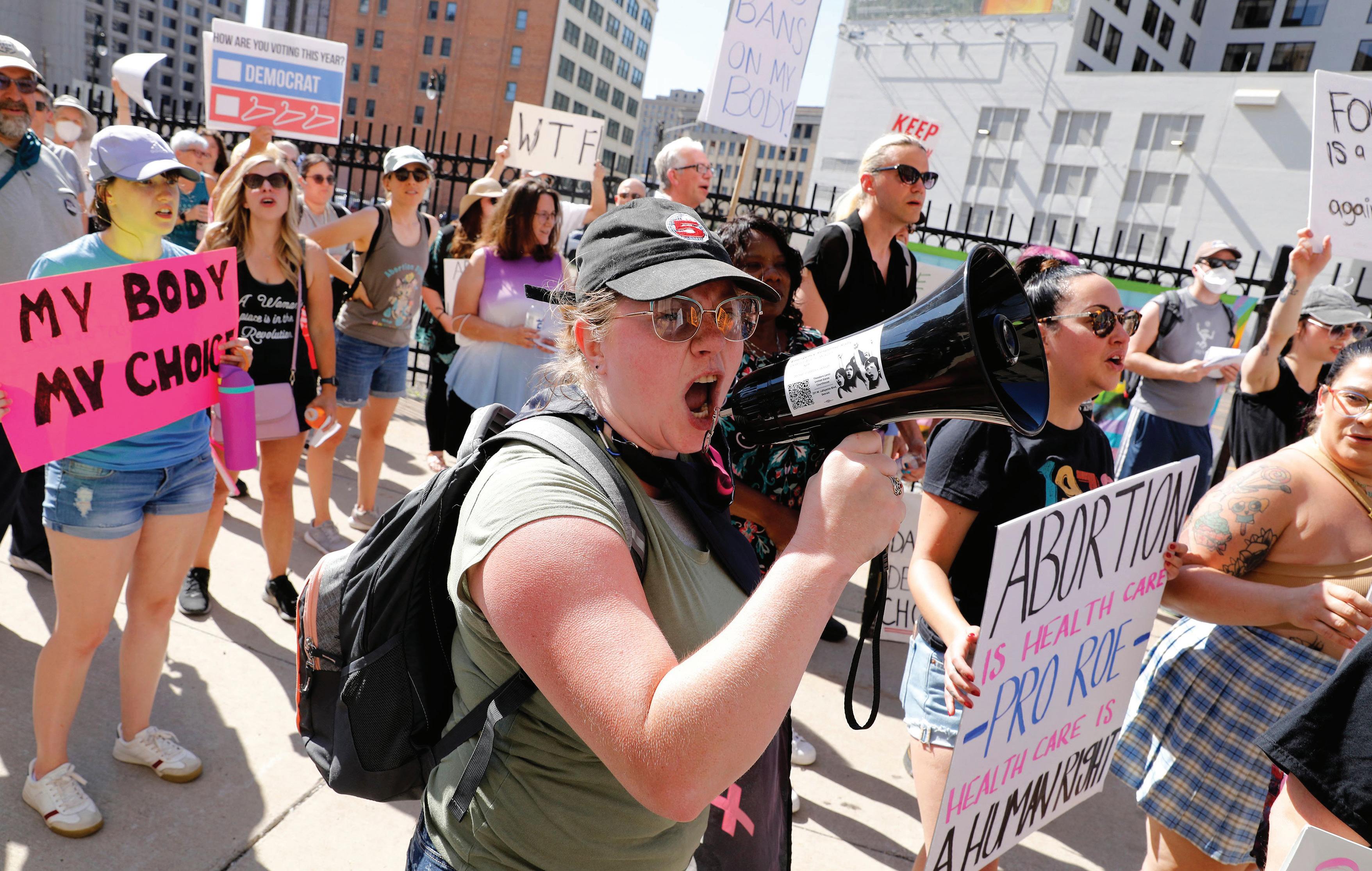
The Florida Supreme Court recently upheld the 2022 legislative session’s House Bill 5 that restricted abortion after 15 weeks of pregnancy in a ruling on April 1. This effectively allowed for the implementation of 2023’s Senate Bill 300, which further restricted abortion access in Florida to six weeks. SB 300 went into effect on May 1.
Prior to the ruling, Florida was one of the only states in the south that did not heavily restrict abortions. Now, those in the south seeking abortions out of state will have to travel to Virginia, which has policies classified by the Guttmacher Institute as “restrictive” but allows for abortion up until the third trimester, or Illinois, the closest state with “protective” abortion policies.
However, in a separate ruling on the same day, the Florida Supreme Court approved an amendment to be put on the ballot during the November 2024 general election that if passed by voters would enshrine abortion rights explicitly in the Florida Constitution.
Gov. Ron DeSantis signed SB 300, dubbed the “Heartbeat Protection Act,” into law on April 13, 2023 to take effect the next day on April 14, 2024. It bans abortion in the state after six weeks; the law followed HB 5, which went into effect in 2022, that banned abortions after 15 weeks.
“I think it’s ridiculous,” junior Liam Alvarez said. “There have been various scientific studies done by the American College of Pediatrics, the American College of Obstetricians and Gynecologists, along with various other institutions that have concrete evidence that a fetus can’t experience pain earlier than 24-25
weeks. Six weeks is also not nearly enough time to get an abortion, many assigned female at birth people don’t even realize they are pregnant until many weeks after conception.”
The law makes exceptions in cases of rape, incest or human trafficking.
“Brain waves in children start at six weeks; it’s been observed, and I think that indicates a level of consciousness...” freshman Jeremy Nath said. “When it comes to a baby that actually has, you know, primitive brain function and has a heartbeat, I think that’s when
Florida Supreme Court paves way for six-week abortion ban; allows constitutional amendment that would enshrine abortion rights in constitution to appear on November 2024 ballot
the issue of abortion, 76% do not support SB 300, which banned abortions after six weeks.
A study published in 2022 in the Perspectives on Sexual and Reproductive Health found that 36% of surveyed pregnant people took their pregnancy test at 6 weeks and another 21% took it at 7 weeks or more.
Of the 36%, it would likely be hard for them to obtain an abortion within the legal timeframe, as patients in Florida must receive an ultrasound and make two appointments in order to receive an abortion: one for in-person
“
I think [Amendment 4] absolutely should be on the ballot, and that if it’s successful, it will help roll back some of the oppressive legislation Florida has been attempting to implement against abortions.”
Liam Alvarez, 11
[life] technically starts… Any time before that, I think, is understandable for an abortion.”
The law drew criticism throughout its time in legislative committees and after DeSantis signed it into law. Opponents argued that many pregnant people do not learn that they are pregnant until after they would no longer be able to legally acquire an abortion, especially among those with unintended pregnancies.
“I’m pretty upset about this restriction because some women don’t even know they are pregnant after six weeks,” senior Melina Carpio said.
According to an Eagle Eye News survey of 323 MSD students regarding their opinions on
counseling and one at least 24 hours after the counseling appointment for the abortion.
According to an Eagle Eye News survey of 327 MSD students about reproductive education, 24% of students are or have been sexually active. Of these teens, 37% had a “pregnancy scare,” where they believed themselves or their sexual partner(s) to be pregnant; 9% of the 24% of sexually active teens had a pregnancy scare that turned out to be a pregnancy.
Based on survey results, 3% of MSD students have needed an abortion and received one, 2% have needed an abortion and not received one and 1% needed an abortion and traveled to
receive one out of state; 38% of respondents answered that the question does not apply to them.
Banning abortion could limit these teens’ access and force them to either carry out the pregnancy or travel to a different state to get an abortion. In the survey, 44% answered that abortion restrictions have caused them anxiety and/or worry.
Abortion already was a process for minors in the state of Florida; a constitutional amendment, Amendment 1, was approved in 2004 to require parental notice for a minor to terminate their pregnancy 48 hours before the procedure. Parents must consent to the procedure, but these requirements can be waived by a judge.
Shortly after going into effect, HB 5 had a pending lawsuit filed by the American Civil Liberties Union, Planned Parenthood and several abortion providers before the Florida Supreme Court. The lawsuit, Planned Parenthood of Southwest and Central Florida et al. v. State of Florida, focused on the Privacy Clause of the Florida Constitution.
Both Roe v. Wade and the case that reversed it, Dobbs v. Jackson Women’s Health Organization, focused on the privacy amendment of the federal constitution. In the original Roe v. Wade ruling in 1973, the United States Supreme Court determined that the 14th Amendment of the U.S. Constitution, which implies the right to privacy, applies to the right to receive an abortion.
The reverse was found true in Dobbs, where the U.S Supreme Court determined that this is not true, as the right is neither explicitly stated in the Constitution nor “deeply rooted in the nation’s history and tradition” and “implicit in the concept of ordered liberty,” per Supreme Court Justice Samuel Alito in the majority
opinion for Dobbs.
The Florida Constitution, unlike the 14th Amendment in the federal constitution, explicitly grants the right to privacy.
“Every natural person has the right to be let alone and free from governmental intrusion into the person’s private life except as otherwise provided herein,” Article I Section 23 of the Florida Constitution says. “This section shall not be construed to limit the public’s right of access to public records and meetings as provided by law.”
The ACLU alleged in their lawsuit challenging HB 5 that the Privacy Clause guarantees the right to an abortion as it applies to their right to be “left alone and free from governmental intrusion.” The Florida Supreme Court ultimately sided against the ACLU, as well as Planned Parenthood and the abortion clinics in a decision released on April 1.
“After considering each of these sources and consistent with longstanding principles of judicial deference to legislative enactments, we conclude there is no basis under the Privacy Clause to invalidate the statute,” the Florida Supreme Court opinion from Planned Parenthood of Southwest and Central Florida v. the State of Florida said. “In doing so, we recede from our prior decisions in which–relying on reasoning from the U.S. Supreme Court has rejected–we held that the Privacy Clause guaranteed the right to receive an abortion through the end of the second trimester.”
The decision upheld HB 5 6-1. It drew criticism because DeSantis, who has openly shown support for abortion restrictions in Florida, has appointed five of the seven justices on the Florida Supreme Court.
“I feel scared for anyone this ban could affect because in my opinion, a safe abortion should be accessible regardless of how long you’ve been pregnant,” senior Madison Brickley said. “...I’m especially concerned for lower income people in this situation because Lord knows if they’ll be able to get a safe, legal abortion at all, let alone one by six weeks.”
In a separate ruling on April 1, the Florida Supreme Court approved ballot language for Amendment 4, to be placed on the November 2024 ballot: one that would enshrine abortion protections into the Florida Constitution.
Amendment 4, if passed, would create a new section in the Declaration of Rights in Article I of the Florida Constitution that determines “no law shall prohibit, penalize, delay or restrict abortion before viability or when necessary to protect the patient’s health as determined by the patient’s healthcare provider.” This would generally allow abortion in Florida up to 24 weeks.
“I think it absolutely should be on the ballot, and that if it’s successful, it will help roll back some of the oppressive legislation Florida has been attempting to implement against abortions,” Alvarez said.
Floridians Protecting Freedom is sponsoring the amendment and has gathered support from the ACLU, Planned Parenthood, the American College of Obstetricians and Gynecologists, Florida doctors and law professors. Florida Attorney General Ashley Moody, Susan B. Anthony Pro Life America, the National Center for Life and Liberty, Florida Voters Against Extremism and the Florida Conference of Catholic Bishops have publicly opposed the amendment.
“We are deeply disappointed with today’s decision [to uphold HB 5]–but with abortion on the ballot in November, this is far from over,” ACLU Reproductive Freedom Project staff attorney Whitney White said in a press release following the two Florida Supreme Court decisions on April 1. “We won’t give up the fight to restore the reproductive freedom of every person seeking care in Florida.”
The amendment is a citizens’ initiative, one of four ways in which an amendment can be proposed in Florida: a citizens’ initiative, a joint resolution of the Florida Legislature, a proposal from the Constitution Revision Commission or proposal from the Taxation and Budget Reform
Commission.
The initiative was first filed by Floridians Protecting Freedom on May 8, 2023, only a few weeks after SB 300 was signed into law by DeSantis.
“A baby, after it’s been born, isn’t selfsustaining, so the fact that a baby can’t exist outside the womb shouldn’t indicate its right to live,” Nath said. “I think a baby’s ability to have primitive thought or brain function should indicate that there is now a sentience that’s expanding. I don’t think it’s entirely indicative of this, like, clump of cells that has no life until the moment it’s born.”
Citizens’ initiatives in Florida require signatures from 8% of the number of voters in the last presidential election from across half of the state’s congressional districts. According to Ballotpedia, citizens’ initiatives require 891,523 signatures based on the number of voters in the 2020 presidential election. The signatures must be spread across 14 of Florida’s 28 congressional districts.
The state allows for proposed measures to be reviewed by the Florida attorney general and supreme court after 25% of the required signatures are collected. The Florida Division of Elections reported the campaign for Amendment 4 submitted the minimum number of signatures on Sept. 1, 2023.
Moody filed a brief with Florida Supreme Court, arguing that the initiative should not appear on the ballot as it was vague and lacked definitions.
“The people of Florida aren’t stupid–they can figure things out,” Chief Justice Carlos Muñiz said at the Feb. 7 hearing on Amendment 4. “People can see for themselves whether it’s too broad or vague.”
Amendment 4 surpassed the minimum number of signatures, as confirmed by the Florida Division of Elections on Jan. 5, 2024, by over 100,000 signatures. It received 996,512 valid signatures. The Florida Supreme Court ultimately allowed for Amendment 4 to appear on the ballot, alongside five other proposed
*Results
constitutional amendments, in November.
“There’s no need to justify ‘Yes on 4,’” debate teacher Jacob Abraham, who signed the Amendment 4 petition, said. “... There’s no need to defend ‘Yes on 4,’ it is just implicitly the right thing to do.”
Proposed amendments in the state of Florida must receive three-fifths, or 60%, of the vote in order to be enacted. While a notably high threshold, similar initiatives have passed in typically “red” Republican-leaning and “purple,” balanced Republican and Democratic, states in recent years.
There were a record number of ballot measures addressing abortion in 2022; California, Kansas, Kentucky, Michigan, Montana and Vermont all had ballot measures addressing abortion. In all, voters chose not to criminalize abortion.
In California, Michigan and Vermont, voters approved amendments similar to Florida’s that enshrined abortion rights into the state constitution. In Kansas and Kentucky, voters rejected a ballot measure that claimed nothing in either of their respective state constitution’s creates a right to abortion or requires government funding for abortion. Voters in Montana rejected a proposed amendment that would consider infants born alive at any stage of development legal persons and require medical care be provided for infants born alive after any method, including attempted abortions.
It remains to be seen how Floridians will react to the amendment, as California, Michigan and Vermont have a lower 50% threshold for amendment approval.
Election Day is Tuesday, Nov. 5, and the deadline to register to vote is Monday, Oct. 7, which is 29 days before Nov. 5. Among other ballot measures such as the presidential election and an amendment to legalize recreational marijuana for those above 21 years of age, voters will get to decide whether abortion access deserves a place in the Florida Constitution.
BY Brynn Schwartz
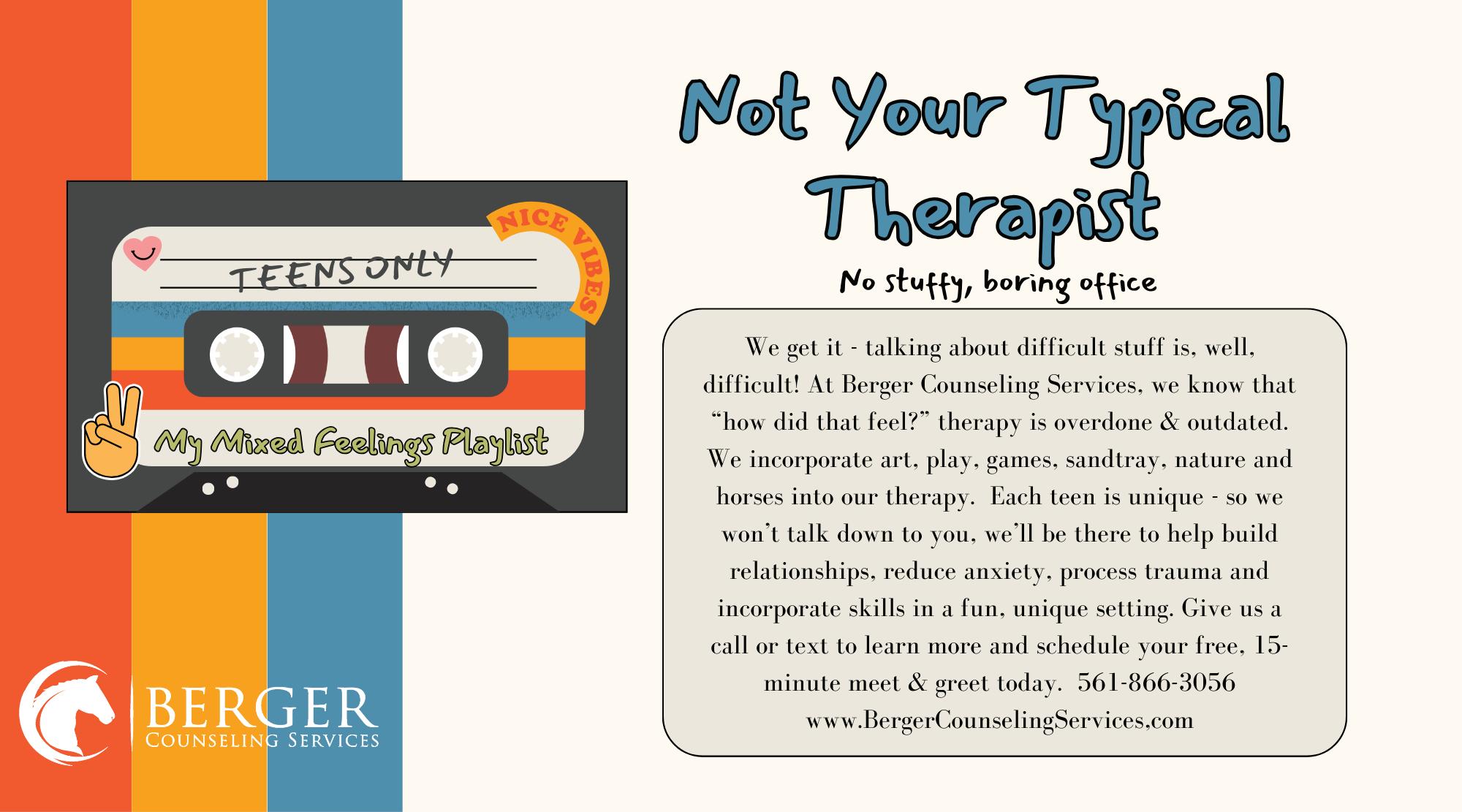


Amendment 1, if approved, would cause district school board races to return to partisan races, which are elections in which candidates have to state their political party.
“It’s about transparency, and I simply believe that we have an obligation to give voters as much information about a candidate as possible, and let them make a decision about vetting a candidate,” Rep. Spencer Roach, who sponsored the amendment, said during a Florida House panel.
Florida voters passed a constitutional amendment in 1998 to make district school board races nonpartisan, or without political affiliation.
Opponents of the bill say that it will only make school board elections more contentious. Passing the amendment, its critics contend, could possibly exacerbate political division, especially in regards to topics like race, banned books and LGBTQ+ education.
“I think there are certain parts of our system where now we have politicians becoming too involved,” sophomore Zain Siddique said. “Politicians being involved in education isn’t inherently bad, but there are certain things being passed that do change education for the worse.”

Amendment 4 would prevent laws that would illegalize, delay or restrict abortion. Currently, the Florida Legislature restricted abortions after six weeks of pregnancy.
According to an Emerson survey, 40% of Florida voters want to reverse the current six-week abortion ban, and many are undecided on the abortion issue. Currently, only California, Colorado and Vermont have abortion rights in their state constitutions.
“I think abortion is a form of healthcare and should be available to all women,” sophomore Samera Kathuria said. “It is something that is their choice and shouldn’t be restricted as it is their body, and I believe everyone should have the ability to choose.”
Supporters of the amendment say that making abortions illegal will increase the rate of unsafe abortions in Florida. According to a study, illegal abortions are 30 times more likely to cause death than a legal abortion. Human Rights Watch has declared access to safe abortions a human right.
According to the University of California San Francisco, one in three people find out about their pregnancy at six weeks or later, which critics say makes the current restriction unrealistic for most women.

n November, Floridians will be able to vote on six constitutional amendments on the ballot. These amendments will have the ability to change and add to the Florida Constitution. Constitutional amendments are placed on the ballot through a joint resolution by the Florida Legislature, citizens’ initiatives, proposals from the Constitution Revision Commission or proposals from the Taxation and Budget Reform Commission. They will become a part of the constitution depending on whether or not three-fifths of voters approve them for passing. STORY BY
Natalia Dzielnicka
Amendment 2 would make hunting and fishing a public right.
Opponents of the bill say that the amendment will continue to shrink populations of native plant and animal species. The proposed amendment would also allow Floridians to employ “the use of traditional methods” of hunting and fishing, which includes ones that are now widely considered inhumane.
“Humane ways of fishing are important,” sophomore Shawn James said. “ But, [if people weren’t allowed to fish], people’s hobbies and jobs would be revoked.”
Opponents say that the continuation of hunting and fishing traditions can only be conserved by conserving the fish and wildlife being hunted.
“We are in the midst of a global extinction crisis and a climate crisis. Our wildlife need a break from the carnage,” the Humane Wildlife Consulting of South Florida said. “We should be accelerating measures to alleviate the harm being done and mitigate the damage, which includes taking proactive measures to eliminate, as best we can, the unnecessary trapping and senseless killing of our wildlife and to incentivize nonlethal control measures.”

Amendment 5 would require an annual adjustment for inflation to homestead exemptions. Annual adjustments use tax withholdings of the previous year to obtain a refund in the current year. In essence, homestead exemptions reduce the amount of real estate taxes that need to be paid for residential property. This would allow for housing to become more affordable.
“Florida houses are too expensive as a house is almost two years of a Floridian’s salary with the average being $200,000 and the average cost of homes being almost $400,000,” freshman Isabel Mayor said.

Amendment 3 would allow the legal purchase and use of recreational marijuana for adults 21 years of age and older.
According to a Pew Research survey, 60% of U.S. adults say that marijuana should be legal for recreational use by adults; however, opponents say that marijuana is a health issue. According to the American Lung Association, people who smoke marijuana become more likely to develop respiratory illnesses. Alternatively, marijuana has also been suggested as a treatment for reducing chronic pain, managing anxiety disorders and lowering cancer risk.
This amendment is backed by Safe & Smart Florida, which is in turn backed by Trulieve, a medical marijuana company. Supporters of the bill say that making marijuana legal will create jobs and return value in the form of tax revenue, as well as reduce the costs of enforcing the current ban.
“[Marijuana] is like alcohol even when banned, people still do it, so why not make it legal and allow it to be controlled a little more,” freshman Isabel Mayor said. “If people want it, they will get it no matter what.”

Amendment 6 would repeal Section 7 of Article VI of the Florida Constitution, which had put in place spending limits for state-wide government candidates. Spending limits would be removed for campaigns of candidates, like those running for governor, who use public funds for their campaigns.


“I think [spending limits] should be whatever they want, it’s their money,” sophomore Hailey Weiner said. “People’s opinions are people’s opinions. As long as you keep updated and state your opinion online, that gets the message across just as much as spending millions on [political] commercials.”
According to a Pew Research Center survey, 80% of Americans want to limit campaign spending. Supporters of the bill say that candidates need more money to communicate with voters, especially with rising costs. Opponents of the bill say that lobbyists have too much influence on candidates, with companies spending millions of dollars in order to have candidates that advocate for their interests.

With over 12,225 member offices in 197 countries around the world, WCAworld is the world’s largest and most powerful network of independent freight forwarders. The combined logistics might of the WCAworld membership exceeds that of even the world’s largest multinational freight forwarders.
210 North University Drive, Suite 700 Coral Springs, FL 33071
Contact Us At: (954) 973-5537 social@wcaworld.com wcaworld.com
Follow us on YouTube, Facebook, LinkedIn, X, Flickr, and Weibo for updates about WCA World

Court case settlement in ‘Parental Rights in Education Act’ lawsuit brings clarity to law
The Parental Rights in Education Act, informally known as the “Don’t Say Gay’’ law, has been a topic of heated conversation since it was first passed by Florida Gov. Ron DeSantis back in 2022. Criticized by members and allies of the LGBTQ+ community due to its seeming censorship of LGBTQ+ related topics, the law was championed by the governor as one that gives parents a greater degree of say in their children’s education.
While having been unsuccessfully challenged several times before, on Monday, March 11, a group of plaintiffs composed of parents, teachers and students who opposed the law and the state of Florida reached a settlement that was submitted to the 11th U.S. Circuit Court of Appeals. The settlement clarifies much of the confusion and fear that has surrounded this law since its passing.
The settlement makes it permissible for the topics of gender identity and sexual orientation to be discussed in classrooms and explicitly states what teachers and students can and cannot do as a result of the Parental Rights in Education Act.
“When I first heard about his law being passed, all that I heard around school was how confused all the teachers were and how worried they were about having to potentially choose between making their students feel accepted or losing their job,” sophomore Emma Schwartz said. “Now that this settlement has been passed everything has been made straightforward; there is no more confusion.”
HB 1557 restricts classroom curriculum surrounding gender and sexual orientation in grades K-3 and from fourth through 12th grade depending on what is deemed age appropriate by the state.
This law was updated and further extended in 2023 by HB 1069, dubbed the “Don’t Say They” law, which requires Florida school districts to obtain parental permission in order for students to be called a name other than the one they were assigned at birth. Seeing as this includes both preferred names and nicknames, critics argue that the law unfairly targets transgender students.
The vague language of these laws left many people uncertain about to what extent people could support LGBTQ+ individuals and discuss LGBTQ+ topics in classrooms.
“I was horrified [by the Parental Rights in Education Act],” English teacher Debra Jacobson said. “I do not understand the need for a small few to inflict their religious beliefs
on everyone else. I did clean out my classroom library, and I am on a library committee that determines if a book is suitable or not. We are all human beings and as such deserve respect.”
The plaintiffs had been challenging the aspects of the Parental Rights in Education Act that dealt with the restriction of “classroom instruction” “on sexual orientation or gender identity.” Specifically, many were concerned with whether “classroom instruction” included any conversation surrounding sexual orientation or gender identity topics. The settlement made clear that the meaning of “classroom instruction” is “the formal work of teaching that occurs in a classroom setting” and thus, where the line is drawn between instruction and discussion on such topics.
exist in classrooms in which their identities are not being ignored,” senior Anna Celine Johansson said. “Preventing their identity as LGBTQ+ individuals from being discussed tells them that they do not belong and are not good enough. Now that we can talk about stuff like this again, it allows them to feel accepted in school environments.”
“ It is important for students to be able to exist in classrooms in which their identities are not being ignored.”
Anna Celine Johansson, 12
Also made clear by the settlement is that the following things are permissible in schools as they pertain to gender identity and sexual orientation: classroom references, debates, nondiscrimination measures, bullying prevention, extracurricular activities and library books.
In lieu of the widespread confusion created by HB 1557, the settlement–while not repealing the law as those opposing it had hoped–does serve to clarify all of the uncertainty surrounding it. The agreement containing the details of the specifications is even being sent out to all of Florida’s school boards as per the settlement’s terms.
The ambiguity surrounding the allowance of non-instructional LGBTQ+ conversations and media in the classroom is among those that were put to rest. According to the settlement, such conversations can be had so long as LGBTQ+ topics are not being instructed on. Additionally, books in teacher and school libraries can discuss gender identity and sexual orientation so long as they are not being used for instruction.
The settlement also dictated that any gender and sexuality instruction deemed age appropriate enough to be had in schools must be taught neutrally. Therefore, being heterosexual or cisgender cannot be made to seem better than being homosexual or transgender and so on and so forth in lessons.
“It is important for students to be able to
Beyond clarifying the teaching–related ambiguities that came with the Parental Rights in Education Act, the settlement provided additional clarifications regarding the ways in which schools could protect and support their LGBTQ+ staff and students. This proved important as one of the most pressing concerns among the law’s opponents was the ability of schools to provide LGBTQ+ students with a safe, validating and welcoming space.
“It is important that LGBTQ+ identities are not just now being allowed to be discussed in classrooms but also to be protected,” Johansson said. “Allowing LGBTQ+ identities to be talked about is the bare minimum; they deserve to be protected and provided with safety. It is not their job to apologize for their existence, rather it is the school’s job to make them feel as if they never have to.”
This ability of schools will remain intact as a result of the settlement, which made it clear that gender and sexuality alliances are still allowed, as are anti-bullying measures. Allowed as well are posters, flags, pins and other classroom decorations that make it known to LGBTQ+ students that they are welcome and accepted by their teachers and peers.
“What this settlement does, is, it reestablishes the fundamental principle, that I hope all Americans agree with, which is every kid in this country is entitled to an education at a public school where they feel safe, their dignity is respected and where their families and parents are welcomed,” lead lawyer for the plaintiffs Roberta Kaplan said in a statement issued in a March 2024 article by Equality Florida.
Moreover, the settlement did not just ensure that the identities of LGBTQ+ students were not being censored, but also the identities of LGBTQ+ teachers. Many of these teachers
were concerned that HB 1557 would prevent them from being a part of the community openly in their classrooms or even display a photo of their family, a fear that the settlement made clear was no longer necessary.
These clarifications in the settlement satisfied the plaintiffs despite their failure to get the law repealed completely.
“Simply put, the state of Florida has now made it clear that LGBTQ+ kids, parents and teachers in Florida can, in fact, say that they are gay,” Kaplan said in a March 2024 article by the New York Times.
DeSantis and his administration were also satisfied with the settlement, as the remaining restrictions still validate the law’s original purpose–ensuring parental rights in education.
“[The settlement is] a major win against the activists who sought to stop Florida’s efforts to keep radical gender and sexual ideology out of the classrooms of public-school children,” DeSantis’ office said in an emailed statement to a March 2024 article from USA Today.
Ultimately, both parties view this settlement as a win; the law was not fully repealed, yet included much of the action that the plaintiffs had been calling for.
In spite of both groups’ satisfaction, opponents of the law still believe that there is work to be done. For instance, since classroom instruction on gender identity and sexual orientation is still not allowed, sexual education will not include the information necessary for LGBTQ+ students to engage in safe sex and the sections of textbooks that discuss such topics will still need to be omitted from class curriculums.
The nickname policy will still apply to Broward County Public Schools as well, meaning that transgender students may not be able to go by their preferred names at school depending on whether or not their parents are supportive of their identities. Additionally, Advanced Placement African American History will still go untaught in Florida schools, a decision that partially spawned from this law because the course contains a unit on queer theory.
Despite the satisfaction in Florida, this law has inspired similar ones in other states that are currently in place. Progress may have been made in the eyes of Floridians, but similar policies are still in effect in other states, posing implications for LGBTQ+ students similar to those that the Parental Rights in Education Act had posed prior to this settlement.
STORY BY Andie Korenge and Ahana Tippanagoudar

Thirteen-year-old girls forced to give birth, women forced to deal with miscarriages due to nonviable pregnancies, transgender men forced to see through an unwanted pregnancy, women forced to carry the children of their rapists, people of all genders and sexes denied important medication–these are all unfortunately common events in a post Roe v. Wade world.
Such problems are particularly prevalent in states with abortion restrictions, including Florida. The Florida Supreme Court recently paved the way for the implementation of the 2023 law Senate Bill 300, which restricts abortion after six weeks, by upholding the 2022 law House Bill 5 that restricted abortions after 15 weeks. SB 300 took effect on May 1, 2024.
However, in a separate ruling on April 1, 2024, the Florida Supreme Court allowed an abortion amendment to be placed on the ballot for the November 2024 general election by approving the wording of the amendment. The amendment, Amendment 4, would effectively reverse both HB 5 and the later SB 300 if passed; at least 60% of voters need to vote for the passage of the amendment in order for it to be approved.
no exceptions for pregnancies that resulted from rape; Texas had the most, with 45% of rape-related pregnancies originating from the state. The research letter explained that “few (if any)” of these pregnancies resulted in legal, in-state abortions.
By eliminating accessibility to safe abortions, many turn to unsafe options as a way to get one. In fact, a study by the Guttmacher Institute in 2017 found that in countries that do not restrict abortion access, only 1% of abortions were unsafe; in heavily-restricted countries, 31% of abortions were unsafe. There was not a large difference in the number of abortions that occurred, with a 37:34 ratio.
“
Florida’s ballot initiative is important for more than just general abortion access
Dobert attempted to receive an abortion after her fetus was determined to be unviable due to a Potter’s Syndrome diagnosis. The state of Florida provides exceptions in the abortion ban for “fatal fetal abnormalities,” but doctors refused to provide her an abortion for fear of legal backlash.
Abortion laws have effects that far outrange terminating pregnancies. They have led to the denial of prescriptions that may also be used for medical abortions. In Arizona, a 14-year-old girl was denied a refill of a prescription of methotrexate.
Methotrexate has a variety of medicinal uses, including treating cancer and autoimmune diseases, such as rheumatoid arthritis, as it works as an immunosuppressant. Among its many uses though, it can be used to end ectopic pregnancies, which has resulted in many pharmacists’ hesitance to prescribe it to people.
Abortion bans have thus created another crisis for doctors, who are already facing the ever-present ethical question of providing abortions to patients in states where they are heavily restricted.”
Eagle Eye News Editorial Board
Floridians must approve this constitutional amendment for the safety of not only Floridians, but for all people in Southern states that lack abortion access. The closest state to the South with “protective” abortion laws–as classified by the Guttmacher Institute–is Illinois, which bans abortions at fetal viability, which is generally around 24-26 weeks.
This means that for all people in the South, abortions are incredibly inaccessible. As a result of the inaccessibility of abortions in restricted states, it was estimated in a study published by JAMA Internal Medicine in 2024 that over 64,000 women and girls became pregnant as a result of rape across 14 states. Most of these states had
by the numbers
The lack of safety has critical implications for maternal safety in the United States. The U.S. has the highest maternal mortality rate among all developed nations in the world. In a 2020 study by researchers at the University of Colorado Boulder, if the U.S. passed a nationwide ban of abortion, overall maternal deaths would increase by 24%. Florida is the state with the highest expected increase at 29%.
Abortion bans have thus created another crisis for doctors, who are already facing the ever-present ethical question of providing abortions to patients in states where they are heavily restricted.
In fact, even in cases where the pregnant person would technically qualify for an abortion, doctors are turning away patients. For example, Florida resident Deborah
900,000+ people take methorexate
“I think [willingness to prescribe methotrexate is] all over the board. I’ve read lots of stories about this too,” pharmacist Donald Miller said in an interview with Pharmacy Times in 2022. “It seems like even in some states that don’t restrict abortion, pharmacies and physicians are becoming very careful. I’m sure there’s also a lot of pharmacists just dispensing it routinely. But certainly, there’s fear, and well-documented, at least some pharmacies are refusing to fill prescriptions. Also, some doctors or even whole medical systems apparently have put a hold on prescribing methotrexate until they get more clarity on what they can and can’t do.”
Through its wide-ranging effects, Florida’s SB 300 has drastic implications on the lives and livelihoods of people throughout the state and region. Florida must pass Amendment 4 in November to ensure the safety of all Floridians.
EDITORIAL BY Eagle Eye Editorial Board
GRAPHIC BY Grace Brill
78,400 abortions performed on 15 to 19-year-olds in 2017
996,512 valid signatures supporting Amendment 4
Florida implements ‘Online Protection for Minors’ law to regulate minors’ social media use for fair reasons
Regulating social media use in the age of technology is a challenge that is almost impossible to solve.
Social media has become the dominant provider of information to teens and the reason many communities such as BookTok and CosplayTok have formed; however, much of this information is false and many of these communities have formed under inappropriate missions or values. Allowing minors unrestricted access to mature content on social media poses a risk for their well being, leading the government to question whether they should be active participants, and for logical reasons.
The Florida Legislature took this issue into their own hands, creating the “Online Protection for Minors” bill, which terminates the social media accounts of minors under the age of 14, and requires parental permission for minors 14 and older. The bill was signed into law by Gov. Ron DeSantis on Monday, March 25 and will implement the regulations on all platforms that “employ algorithms that analyze user data” and “have certain addictive features.”
While social media is not new, the addiction to platforms such as Instagram and TikTok has intensified in recent years. It is rare to see teenagers and even young children without a phone in their hand, scrolling mindlessly. According to a 2024 article from Yale Medicine, there is evidence that social media is causing harm to children’s mental health, which poses the question of whether social media does more
harm or good.
Children’s addiction to their phones has become a growing problem within schools and families and has even been shown to decrease social skills. By implementing this law, the government has not banned, but restricted access to social media in order to allow children and teenagers to learn both the soft and hard skills necessary to fully develop their life skills.
The law encourages healthy technology habits and fosters a safer environment for children to explore their own beliefs and interests without being influenced by older users. With clearer boundaries around technology, parents can educate their children about the safe use of social media.
Many users under the age of 18 are influenced by older content creators whose target demographic is adults. As a result of watching older creators post videos talking about their personal life in videos such as “get ready with me” and “a day in the life” TikToks, minors recreate them, exposing private information. These videos reach hundreds, if not thousands of strangers on the internet who may not be safe or appropriate to interact with. By restricting access to social media to minors, children can learn the necessary boundaries to practice when posting pictures and videos online.
Many content creators on platforms such as Instagram and TikTok also post videos that may glorify or romanticize mental health issues.
Minors who view these posts may misinterpret
Since the year 1998, Florida has been one of the 41 states with non-partisan elections for school board members.
Amendment 11, section four of the Florida Constitution, had specific verbiage that ensured that “in each school district there shall be a school board composed of five or more members chosen by vote of the electors in a nonpartisan election.”
Now, 26 years later, the Republicancontrolled Florida House of Representatives wishes to abandon this concept in favor of partisan school board elections, which would aid in furthering the corruption of politics in the public school system. It is imperative that voters in the upcoming November election vote against this proposed constitutional Amendment 1, which would allow party affiliation of candidates to appear on the ballot.
By having partisan school board elections, voters will no longer focus on the candidates themselves and the policies they support, but instead on creating a horse race between red and blue districts. The once quiet election of school board members will turn into a public spectacle of pawns within a broader political game when party affiliation comes into play.
Political interest groups who endorse candidates in these elections will then spend time, money and effort on ads and campaigns that will defame or inflate the status of their chosen party–Democrat or Republican.
The inherent problem with this push is that citizens who vote in these elections shift their
the original creator’s message and engage in unhealthy physical or mental behaviors such as self harm or the use of addictive substances.
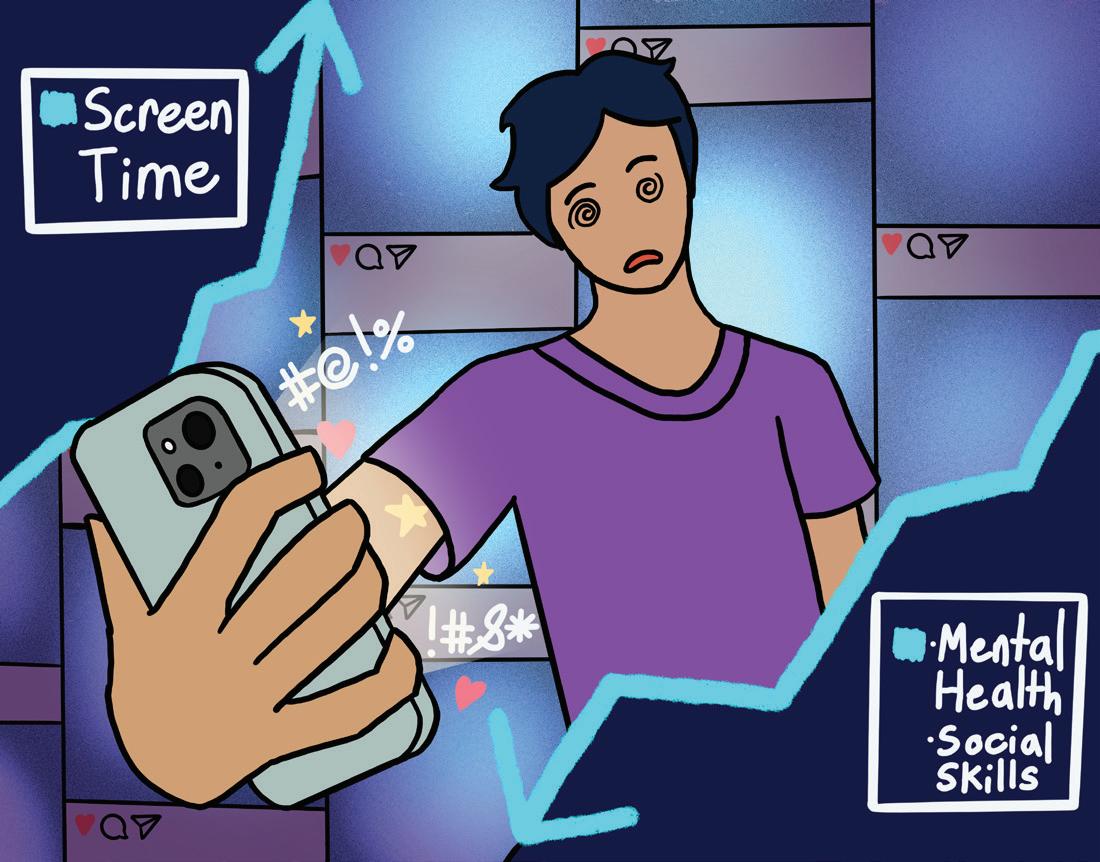
Restricting access to these videos and creators takes precautionary measures to improve mental and physical health due to the reduced exposure to mature and inappropriate content.
Albert Bandura, an expert in psychology, created the idea of social learning theory, which states that children imitate behaviors they observe in others. By witnessing so many other people discuss mental health issues on social media platforms, minors, especially young children, want to relate to the creators they watch, leading them to develop harmful behaviors based on what they see others doing.
Social media does have advantages such as spreading awareness about events and providing a space for open discussions; however, many of these topics are not appropriate for children. Minors having access to social media has allowed them to further their knowledge in subjects outside of traditional school and gain
a deeper understanding of social issues, which could diminish with the implementation of this law. Simultaneously, restricting access to these platforms could possibly limit the exposure of children to harmful content that is posted on social media. The law could improve mental health in younger teenagers and children, as well as create a safer space online.
There are many safe spaces for minors that encourage community without the possible dangers that social media poses. Reasonably, the law is not powerful enough to keep kids off of social media entirely, as they can use family or friends accounts, but it does provide an alternative in which minors can engage in safer social media use.
OPINION BY Lyla Sachs and Ashveen Saini
GRAPHIC BY Grace Brill
School boards should not show party affiliations on the ballot
focus from electing those whose primary goal is to better the lives of students and staff to electing those who are a part of their political group.
The shift to adding party affiliation encourages gridlock within this level of government.
Albertville, Alabama, a district in another one of the four states that have partisan elections, clearly proves that they no longer are concerned with passing policies to improve the lives of students and teachers because for the past five months of 2024, they have not passed a single policy.
If this political stalemate occurs within school districts–notoriously underfunded agencies that already lack the ability to pass policies to improve the lives of schools’ staff and students–it will prevent any growth at all for the people of the districts. Rather, it would motivate the evolution of factions on the school board.
The priority switch of concentrating on parties creates a push of factions in education which is what primarily acts as the main symptom of gridlock. The push for innovation and improvement is then essentially eradicated in favor of more political power.
Similar to gridlock, this concept of factions is also seen within higher forms of government and has been in existence since the U.S. became its own country. George Washington’s Farewell Address points out the dangers of the formation of factions.
“It [political parties] agitates the community with ill-founded jealousies and false alarms;
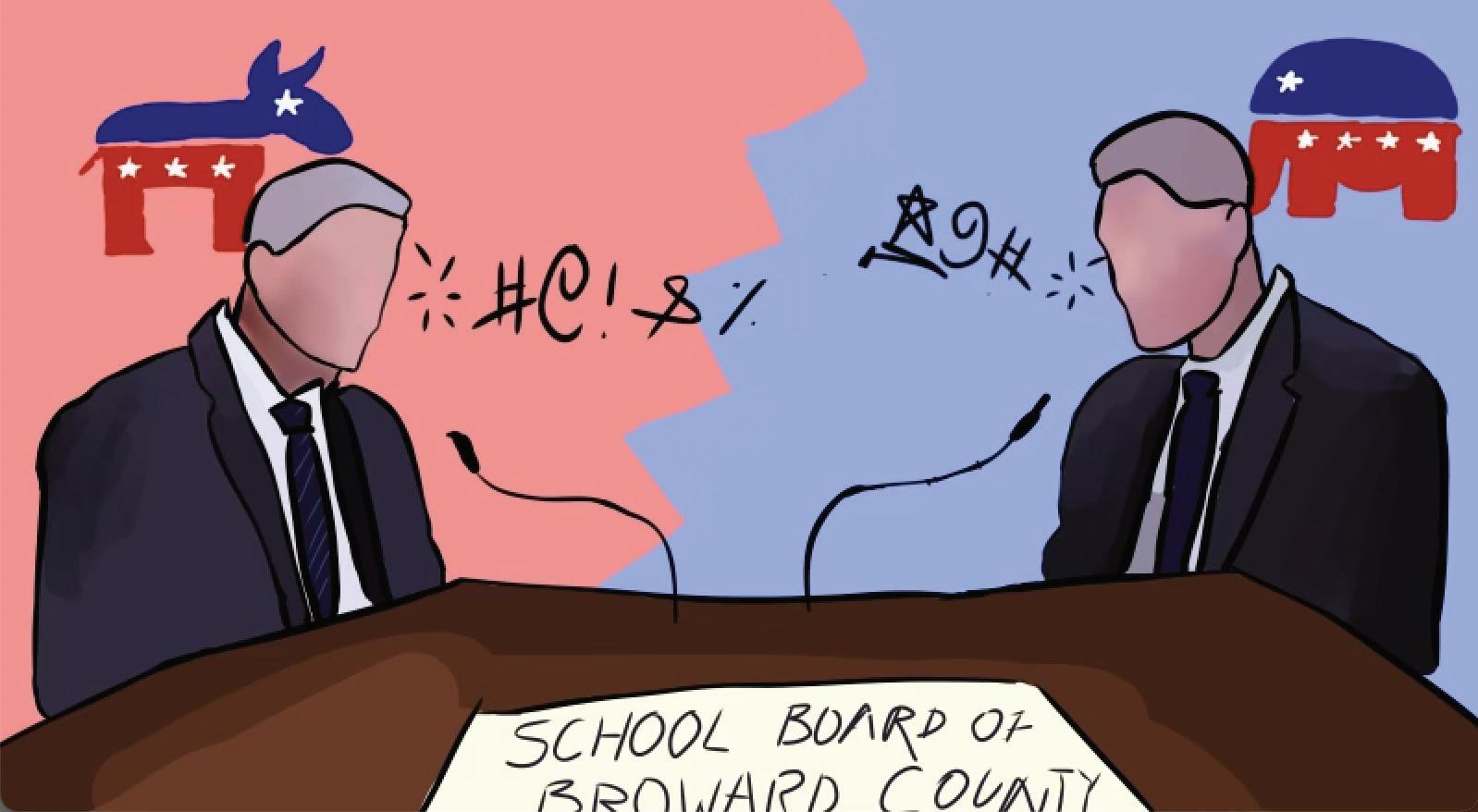
kindles the animosity of one part against another; foments occasionally riot and insurrection,” Washington said.
The animosity Washington speaks of is verily seen through election campaigns and candidate speeches. It can be reasonably assumed that this trend seen in other partisan elections will swiftly follow in line with school board elections. However, unlike other elections, this trend would do much more harm at this level than seen at others.
Having party affiliated board members prevents differing ideals from being contemplated during meetings, as the majority party in power on the board would facilitate the process of group polarization.
This psychological phenomenon occurs when opposing opinions are discussed, with each side doubling down on their stance (even if it does not hold much significance to the person or party) or amplifying and reinforcing their initial ideas until they devolve into extremist views.
As a consequence, the group that is most
impacted are students and teachers. School boards are meant to further and ensure the education of the youth, so when their main concern becomes if they wield any political power they place what should be their ultimate goal on the back burner.
These effects of partisan elections are largely the same no matter what state it occurs in. Extreme ideas are deliberated upon that the opposing party would not agree with, leading to no policy being passed. Thus, no progress is made.
Or, alternatively, extreme ideas are discussed that support the majority party platform that may end up being passed, even if they do not benefit the education of the district’s pupils.
The only way to nip these issues in the bud is if voters vote no in November on proposed constitutional Amendment 1, effectively stopping partisan school board elections from becoming a reality in Florida.
OPINION BY Aisha Hashmi
GRAPHIC BY Natalia Dzielnicka







Music festivals have been a cultural phenomenon since Woodstock drew a crowd of half a million people to a small New York farm in 1969, and now, more than ever, that festival culture is thriving. With Coachella marking the beginning of festival season this year, and others including Lollapalooza, Shaky Knees and Ultra Music Festival right around the corner, many students at Marjory Stoneman Douglas High School are preparing themselves for a music-infused summer.
Music festivals’ popularity was made possible by the growth of social media platforms, which have allowed them to greatly expand their scope. From sharing festival outfits online, to livestreaming performances and buying exclusive merchandise, festivals have developed a culture of their own.
A large part of the appeal of festivals is the diversity of the experiences they offer, as they feature performances from artists across all genres. Not only does this allow for a wide range of music fans to enjoy festivals, but also for them to be introduced to a variety of new musicians and genres.
“I’ve been to a couple of country festivals and the atmosphere is amazing, everyone’s enjoying the music and overall just having a good time,” senior Anthony Risario said. This diversity was exemplified in this year’s Coachella lineup, which included pop sensations Lana Del Rey, Sabrina Carpenter and Reneé Rapp, distinguished rappers Tyler the Creator, Saint Levant and Lil Yachty and prominent indie musicians Faye Webster, Chappell Roan and Suki Waterhouse. There were also a variety of throwback performers, with bands like No Doubt and Sublime taking the stage, along with a long list of others.
However, while it may be now more than ever that festival culture is thriving, so is their exclusivity. With this year’s general admission tickets to Coachella costing between $449 and $499 for the three-day event, festival attendance is as much a status symbol as it is an experience. In a way, this serves to deter fans from music
festivals and make events that are meant to celebrate the arts into ones concerned with monetary earnings.
“Festivals seem really fun, but I haven’t been able to go to any because of how expensive it is,” sophomore Alexa Yale said. “The high prices just don’t make it seem worth it.”
Commonly called the “Influencer Olympics,” Coachella has become a largely influencer and celebrity-dominated event. This comes as no surprise as, in accordance with other high-profile events, brands have taken it upon themselves to sponsor influencers’ attendance of festivals. Brands will pay for their tickets, hotel accommodations and provide them with exclusive access to pre and after parties, and in exchange, influencers generate content for the brands.
outfits are something that attendees often go all out on. Marked by their rather suggestive nature, festival outfits often revolve around pieces that cannot be worn virtually anywhere else.
At the moment, some of the most trending items in festival fashion are sheer and crochet pieces, mini skirts, bows, chunky belts, cowboy boots and other statement clothing pieces.
Influencers are largely judged by viewers based on the outfits they wear to festivals and often, they will meticulously curate their outfits days or weeks in advance, purchasing clothing specifically for festivals.
“
I attended Lollapalooza last year over the summer with my older sister. It was such an amazing experience being able to see my favorite artists perform live in front of so many people.”
Ria Sethi, 10
At this year’s first weekend of Coachella, the popular soda brand Poppi sponsored influencer Alix Earle’s festival experience. The brand brought Earle and a group of her friends to the Coachella Valley, where it went all out on decorating a Poppi-themed home for them to stay in for the festival’s duration.
While at the festival, influencers will generate content about their experiences, sharing it with their millions of followers who want to be there too. Yet, for many people who cannot afford tickets, these influencers’ festival-centric content is the only way they get to experience them. Thus, many live vicariously through influencers’ content, closely following everything they do to make the most out of something they cannot have.
One aspect of festivals that is closely followed by the general public is the fashion. Almost as closely followed as Grammy’s outfits, festival
Content creator Tara Yummy went all out on her Coachella outfits this year, posting vlogs and outfit of the day videos on TikTok. In doing so, Yummy was inviting fans to observe, rate and take inspiration from her outfits, all of which embodied current fashion trends with a unique festival spin.
“Music festival fashion is super fun because you get to go outside of the box and wear super creative and fun outfits, as well as get inspiration from other influencers,” junior Madden Lamb said.
Most festival outfits are impractical to wear elsewhere and wind up being thrown out or never worn again afterwards. This is one of the many wasteful patterns that festivals create. Waste in general has become a problem at these events, with people leaving trash all over the various locations.
According to CNN, festival attendees produce 53,000 tons of waste every year, leading people to call for more eco-friendly practices. One idea that has been proposed as a solution to unsustainability is the use of cardboard camping capsules, as the tents festival goers leave behind
are partially responsible for the waste generated. Additionally, blistering heat and large crowds can result in a lot of dangerous incidents if attendees are not adequately prepared. It is important to carry water, as some festivals do not provide enough, as well as to be aware of mosh pits and overcrowding, both of which can cause injuries.
At Astroworld Festival in 2021, a crowd surged toward the stage on which headliner Travis Scott was performing, leading to ten deaths as a result of compression asphyxia.
Compression asphyxia occurs when an outside force prevents one from expanding their chest in order to breathe. To prevent oneself from being put in such a situation, festival attendees may want to stay at the edge of crowds or leave an area if a crowd feels too dense.
Despite issues, music festivals are still as prominent as ever–while the events themselves may be exclusive, the culture that surrounds them is certainly not. Regardless of whether one can attend or not, music festivals’ lineups never fail to generate excitement as fans look forward to seeing their favorite artists go all out on their performances.
“I attended Lollapalooza last year over the summer with my older sister,” sophomore Ria Sethi said. “It was such an amazing experience being able to see my favorite artists perform live in front of so many people. My favorites were Lana Del Ray, Kendrick Lamar and Beabadoobee.”
This year at Coachella, many prominent singers brought out equally-as-revered guests to perform alongside them; Lana Del Rey brought out Billie Eilish to sing “Ocean Eyes,” No Doubt enlisted Olivia Rodrigo’s help to sing “I’m Just a Girl” and Tyler the Creator made headlines when Kali Uchis, Donald Glover, A$AP Rocky and Charlie Wilson all joined him on stage to perform. Given all of this excitement, there is no doubt that music festivals will remain relevant throughout this summer and well into the foreseeable future.
STORY BY Andie Korenge, Jasmine Bhogaita and Grace Brill


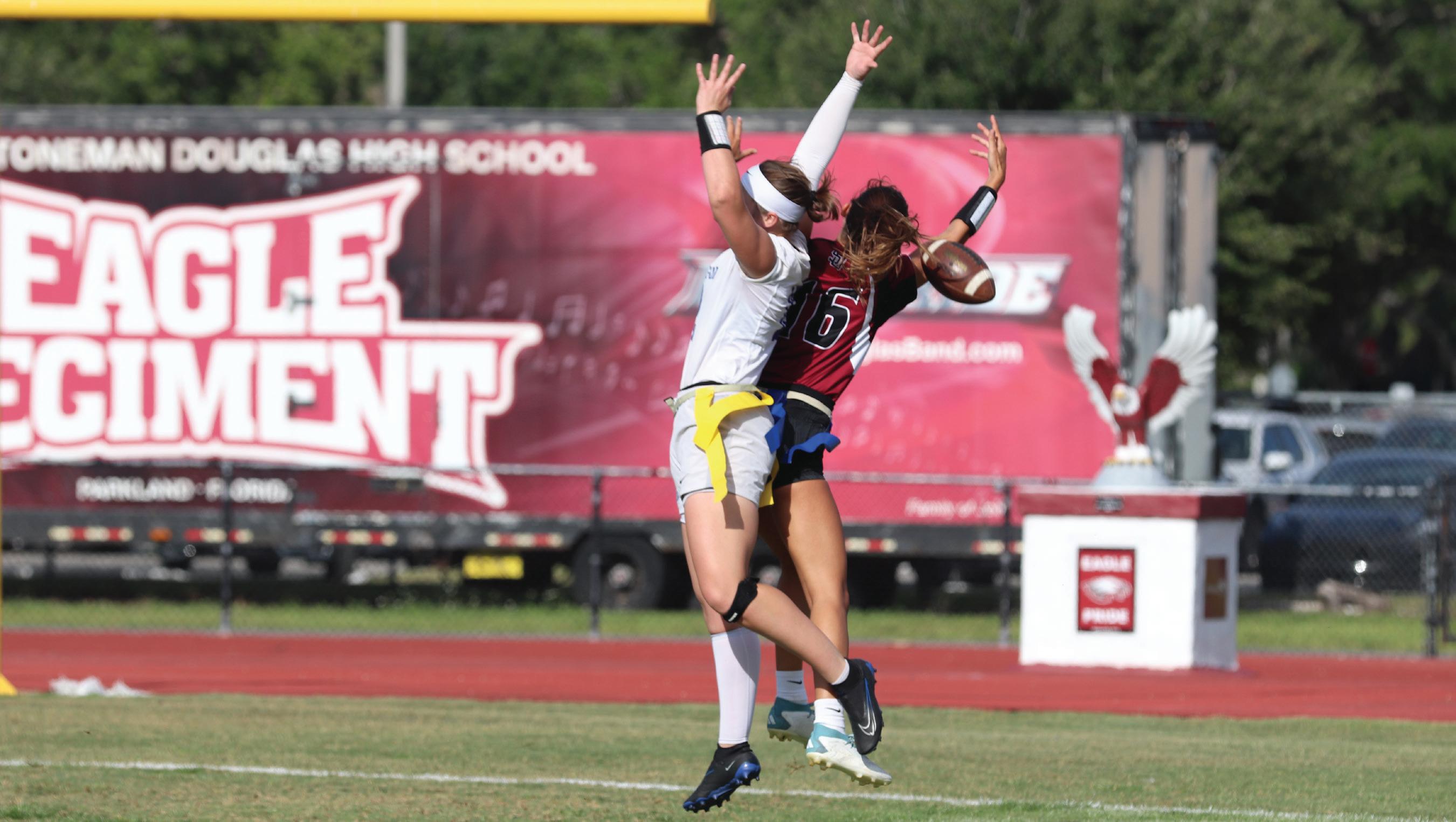
BE ANALYTICAL. Wide reciever Jennider Baksh (6) watches from the sidelines with her fellow teammates on April 24 as the flag football team plated against Wellington High School in the regional semi-finals game. The Eagles lost 0-6. “Playing flag football was a great way to close my senior year,” Baksh said. PHOTO BY Reygan McIntosh
MAKING THE PLAY. Quarterback Sam Calavetta (8) of the Lady Eagles Flag Football Team runs away with the ball while Wellington High School is in pursuit. Calavetta was able to run for a few yards before she was tackled.
KICKIN’ IT. Punter Savannah Tenore (16) kicks the ball towards Wellington High School’s goal post. The loss in regional semi-finals game ended the flag football’s season; the 2024 season was the team’s first return to the playoffs since 2010
BY Natalia Solera
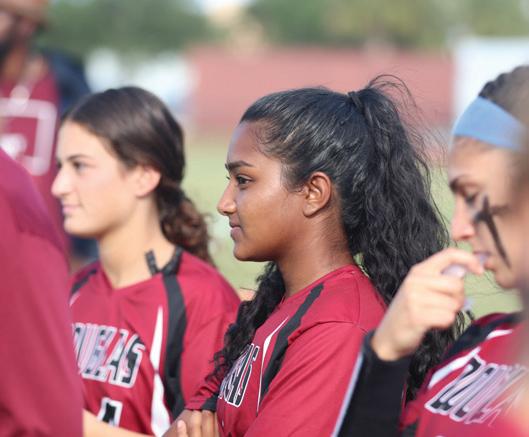
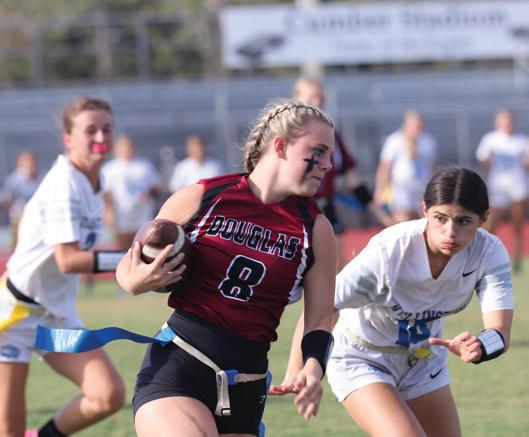
Quarterback Samantha Calvetta (8), the starting quarterback of the MSD’s women’s flag football team, takes the snap and drops back to look for an open receiver. This play is crucial for the Eagles as they try to take a lead over Deerfield Beach High School in the regional championship. With the sound of cheering friends and families encouraging the players, running back Courtney Heymach (24) catches the ball and rushes into the endzone, getting a touchdown. Running back Daria Boykin (9) scores another touchdown later in the game, and the Eagles achieve a 12-6 victory over Deerfield on Thursday, April 16.
Winning this game allowed the Lady Eagles to advance to the regional semi-finals in the state tournament. The last postseason game the Lady Eagles won was in 2010.
“It felt so good to win,” linebacker Morgan Goldman said. “It showed that all of our hard work has paid off and that we can only go up from here.”
The MSD women’s flag football team won 12 games before their district game, losing only two games during the regular season.
Their first game against Deerfield Beach High School on Wednesday, Feb. 21, set the tone for the season. They won 6-0, scoring all 6 points in the second quarter, which were scored by wide receiver Savannah Tenore (16).
“Our first win of the season felt amazing, and it made the girls realize their full potential
and what we can accomplish when we work together,” Tenore said. “The whole team was very proud of each other for doing their part.”
On Monday, Feb. 26, the team experienced its first setback, losing to Boyd Anderson High School with a final score of 13-0.
“After our first loss, we were pretty upset, but it made us work harder. Every day at practice, we pushed ourselves to get better and we became
are so lucky that we made it this far, and I am so thankful for the success we created as a team.
Against Olympic Heights High School, MSD scored seven points in the first quarter, six points in the third quarter and another seven in the fourth; they shut out Olympic Heights until the final quarter. The final score was 20-6.
The Eagles beat Flanagan High School 20-0, scoring seven points in the second quarter and
Our first win of the season felt amazing, and it made the girls realize their full potential and what we can accomplish when we work together.” “
Savannah Tenore, wide receiver
better as a team,” Goldman said.
With this new drive, the Lady Eagles embarked on a winning streak.
The Lady Eagles faced and won against Olympic Heights High School, Flanagan High School, Coral Glades High School, Hollywood Hills High School, Monarch High School, Cooper City High School and Coconut Creek High School.
“It was such a great opportunity to be a freshman on varsity and have a great win streak,” rusher Audrey Haltiwanger (1) said. “We
13 points in the fourth quarter. Tenore scored 12 points, Heymach scored six points, wide receiver Paige Kalvaitis (7) scored one point and Boykin scored another point.
Against Coral Glades High School, Heymach, rusher Kenslee Ward (18), and wide receiver Mickayla Sugrano (2) brought the team to victory, both scoring six points each. The game ended with a 20-7 win.
“The win streak really motivated me and my teammates,” Goldman said. “We wanted to keep our winning streak up and not lose it. If we
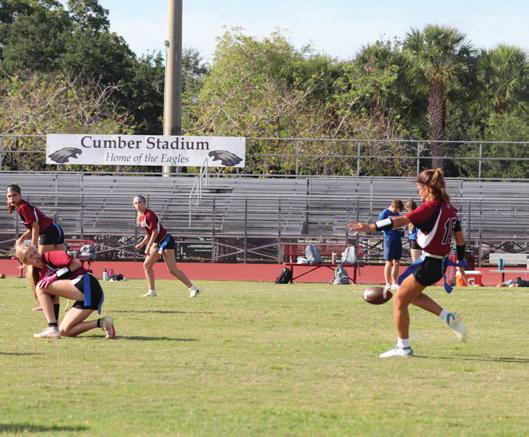
wanted to keep up, we needed to work harder. ” The team’s subsequent games produced high scoring games and shutouts. MSD defeated Plantation High School 50-0 and Cooper City High School 19-0. Against Hollywood Hills High school, the Lady Eagles won 45-8 and then won 34-6 against Coconut Creek High School.
The Lady Eagles faced Deerfield Beach High School on Thursday, April 11 and won 12-6 to claim the district championship.
With their triumph, the team qualified for the regional quarter finals for states. On Thursday, April 18 the team claimed victory against the Coral Springs Colts, winning 20-14.
The team’s season ended at the regional semi-finals against Wellington High School with a 0-6 loss. Wellington scored 6 points in the last quarter to end the Lady Eagle’s run for the state championship.
“I’m sad my final season of high school flag football was cut short, but I am so proud of how this season and how we grew as a program,” Goldman said.
As the season concluded, many team members looked forward to continuing to train individually and as a team during the summer.
Students are able to participate in the “Battle in the Village” event, a flag football workshop where students can assess their goals for the next season. The event will be held at the Village of Wellington Fields, starting on June 21, with a $10 fee on weekdays and $20 fee on weekends.
STORY BY Reygan McIntosh
Gabriela Caro becomes engraved in MSD wrestling history as she ends high school career
Becoming a back-to-back state champion is not an easy accomplishment. It took countless hours of sacrifice, sweat and tears for her to become the wrestler she is today. That is the legacy of senior Gabriela Caro, one of the few female athletes on the MSD wrestling team.
As a senior, Caro won her second straight state championship, and she was awarded the Sun Sentinel's Girls Wrestler of the Year honor in 2024.
Caro started wrestling during her sophomore year of high school, and had it not been for the COVID-19 pandemic, she would have started earlier. Not starting earlier was one of her biggest regrets.
“I wish I could’ve started my freshman year, but I had no control over that since it was during COVID, and my mom was a high health risk,” Caro said.
Caro started jiu-jitsu at just 8 years old, something that helped her when it came to wrestling. She got the inspiration to start jiu-jitsu from her dad, and her love for it took off from there.
“My dad began jiu-jitsu before I did, so I could easily say he was my biggest inspiration for it all,” Caro said. “My Mom is my biggest fan, and my brother is my favorite supporter.”
Since Caro had a background in combat sports she was used to almost everything that came with wrestling. Caro ended up being a natural at wrestling.
“I joined the wrestling team to improve my jiu-jitsu and ended up being good at wrestling, so
[I] began to pursue it,” Caro said.
Caro has been a standout ever since she joined wrestling. As a first-time wrestler in her sophomore year, she made history as the first MSD wrestler to compete in the Florida High School Athletic Association state series. She ultimately lost, but that did not set her back. The next year, she went to states and won the whole competition. She became the first female wrestler in school history to win a state championship.
them, so when it comes time for the match, all these procedures are second nature,” Caro said.
“
Gaby is a great motivator and an even better leader, on and off the mat.”
The day before each match, Caro will start listening almost exclusively to calming music to relax herself and calm any nerves she has. After she finishes her weigh in, she tries to get in her zone, listening to mainly rock music, with some rap included. She has a long warm-up routine to make sure she never comes out unprepared.
Lucas Siqueria, 11
During the months in which wrestling is not in season, Caro stays busy by working out, as well as partaking in club wrestling for the American Top Team in Coconut Creek. She also takes pride in her academics and strives to do well in school.
“During wrestling season, my social life gets put on somewhat of a hold as [the] season is my main focus with schoolwork,” Caro said. “There are some late nights, but I always [tough] it out.”
With the goal of being state champion again, Caro has had to find a way to stay calm and focused. She constantly reminds herself to take the season one match at a time. She also utilizes “mind maps,” which help her stay on the right path during her matches.
“I draw [the mind maps] out before every big tournament; these mind maps consist of a series of moves I do, and when I’m done, I memorize
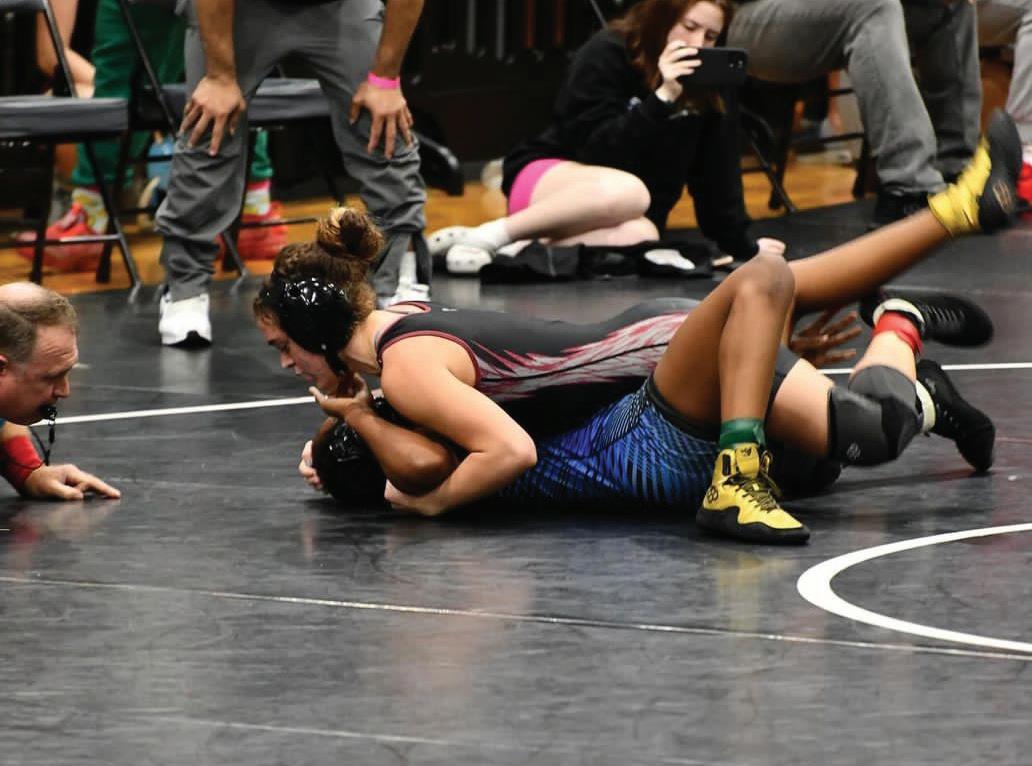

The weightshedding process can be difficult at times, but Caro powers through it and toughs it out. It is a big mental test as well, since she has to lose multiple pounds in a single day for some matches.
“[Her mental toughness] was at a whole different level than any other competitor,” wrestling coach Kenneth Gendason said. “She already competes at a world level, so she’s already used to [the] mental toughness and work ethic and everything that goes with that.”
Caro’s ability to stay focused on one goal has inspired her teammates as well. She takes pride in being a leader on and off the mat.
“She pushes me and the rest of our players to do our best,” junior wrestler Lucas Siqueria said. “Gaby is a great motivator and an even better leader, on and off the mat.”
Caro went all the way to the state championship once again this year and
completed her goal of winning back to back state championships. Her family has supported her throughout her high school wrestling career.
Although she pushes and inspires her teammates to be great, her teammates and coaches also do the same for her.
“My coaches all take time to go over my matches with me and pick apart what I’ve done well and what I need to work on,” Caro said. “On top of all this, my training partners were constantly working with me and allowing me to work with them as we all made each other better throughout the year.”
As Caro looks ahead to graduating this year, she still wants to be involved with wrestling post high school, despite not planning on competing in college. No matter what she does post graduation, no one can deny the immense success Caro has had in her three years as a wrestler.
STORY BY Noah Lechtenstein
TAKEDOWN. Wrestler Gabriela Caro takes down her opponent to earn two points. Caro won three regional championships in her high school career.
HEAD TO HEAD. Wrestler Gabriela Caro looks for ways to set up her attack while in neutral position at the state finals. Caro ultimately won the state championship, earning her second state title.
MAN DOWN. Wrestler Gabriela Caro executes a turk manuever. This offensive move elevates an opponent and then pins them down.
PHOTOS PERMISSION FROM Gabriela Caro/ Ancapele Photography
